Corporate Accounting: Analysis of Financial Statements of Wesfarmers and Woolworths
VerifiedAdded on 2023/06/05
|27
|5012
|116
AI Summary
This report provides an analysis of the financial statements of Wesfarmers and Woolworths, including owner's equity, cash flow, comprehensive income statement, and tax treatment. It also includes a comparative analysis of the two companies over a three-year period.
Contribute Materials
Your contribution can guide someone’s learning journey. Share your
documents today.
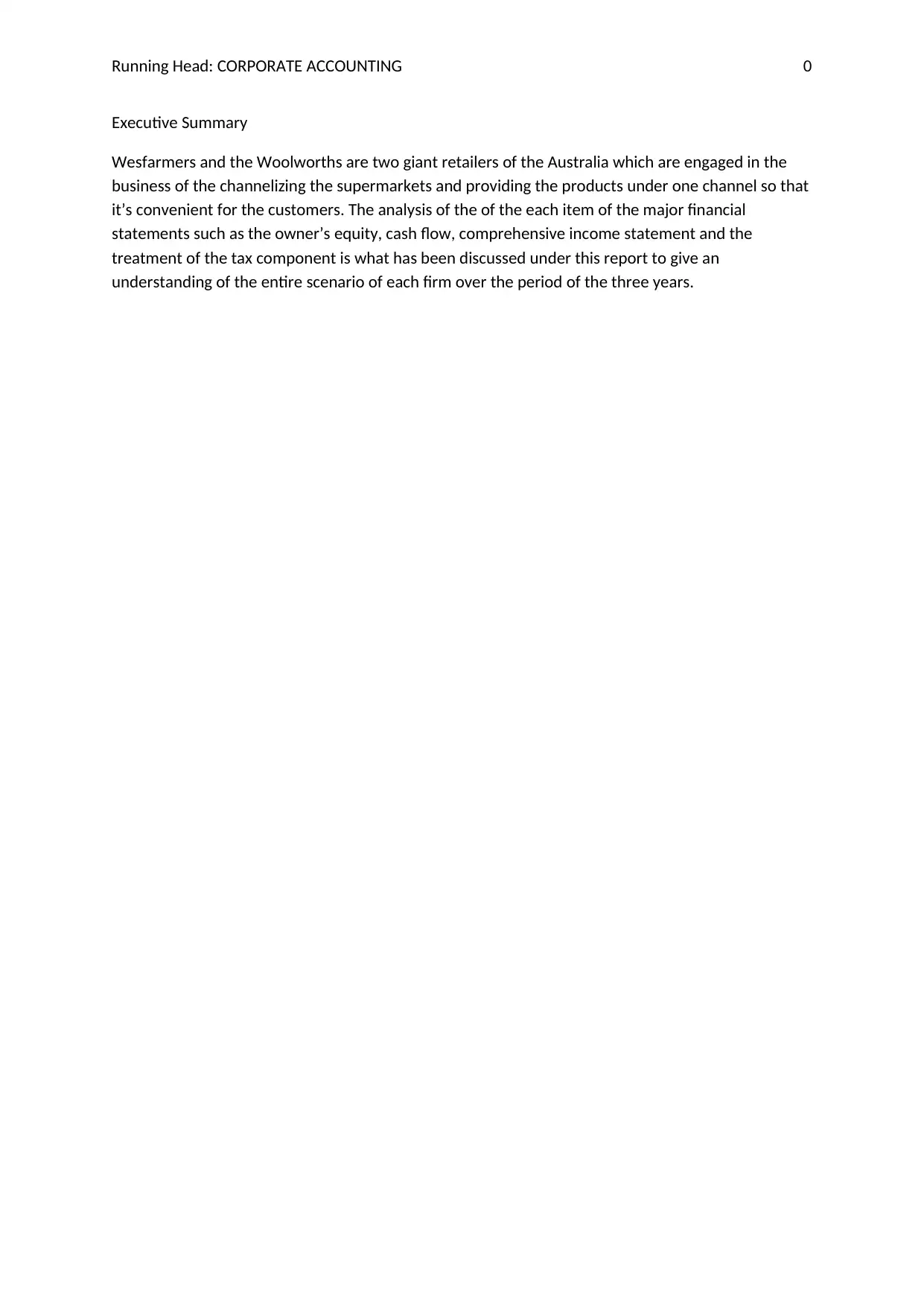
Running Head: CORPORATE ACCOUNTING 0
Executive Summary
Wesfarmers and the Woolworths are two giant retailers of the Australia which are engaged in the
business of the channelizing the supermarkets and providing the products under one channel so that
it’s convenient for the customers. The analysis of the of the each item of the major financial
statements such as the owner’s equity, cash flow, comprehensive income statement and the
treatment of the tax component is what has been discussed under this report to give an
understanding of the entire scenario of each firm over the period of the three years.
Executive Summary
Wesfarmers and the Woolworths are two giant retailers of the Australia which are engaged in the
business of the channelizing the supermarkets and providing the products under one channel so that
it’s convenient for the customers. The analysis of the of the each item of the major financial
statements such as the owner’s equity, cash flow, comprehensive income statement and the
treatment of the tax component is what has been discussed under this report to give an
understanding of the entire scenario of each firm over the period of the three years.
Secure Best Marks with AI Grader
Need help grading? Try our AI Grader for instant feedback on your assignments.
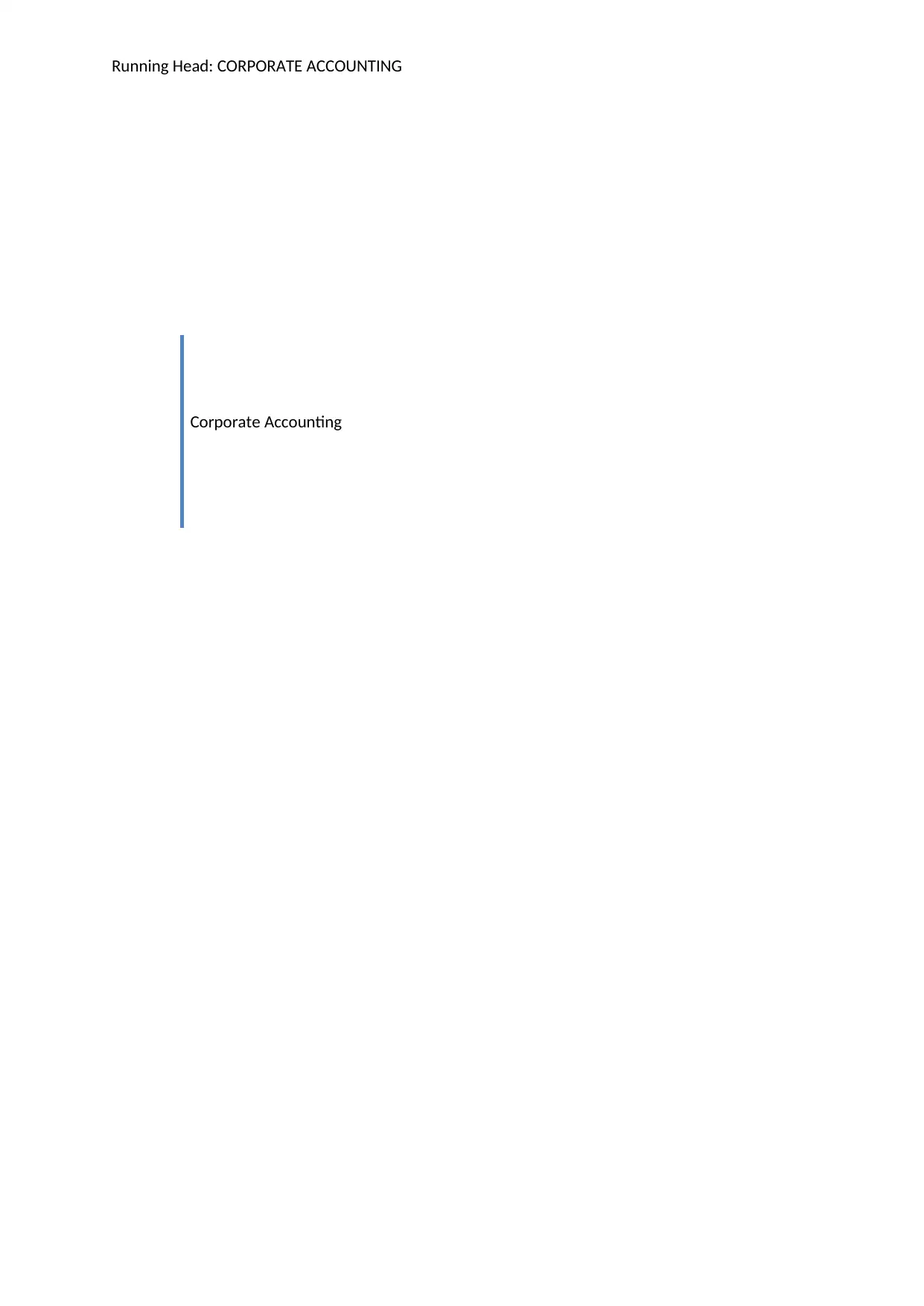
Running Head: CORPORATE ACCOUNTING
Corporate Accounting
Corporate Accounting
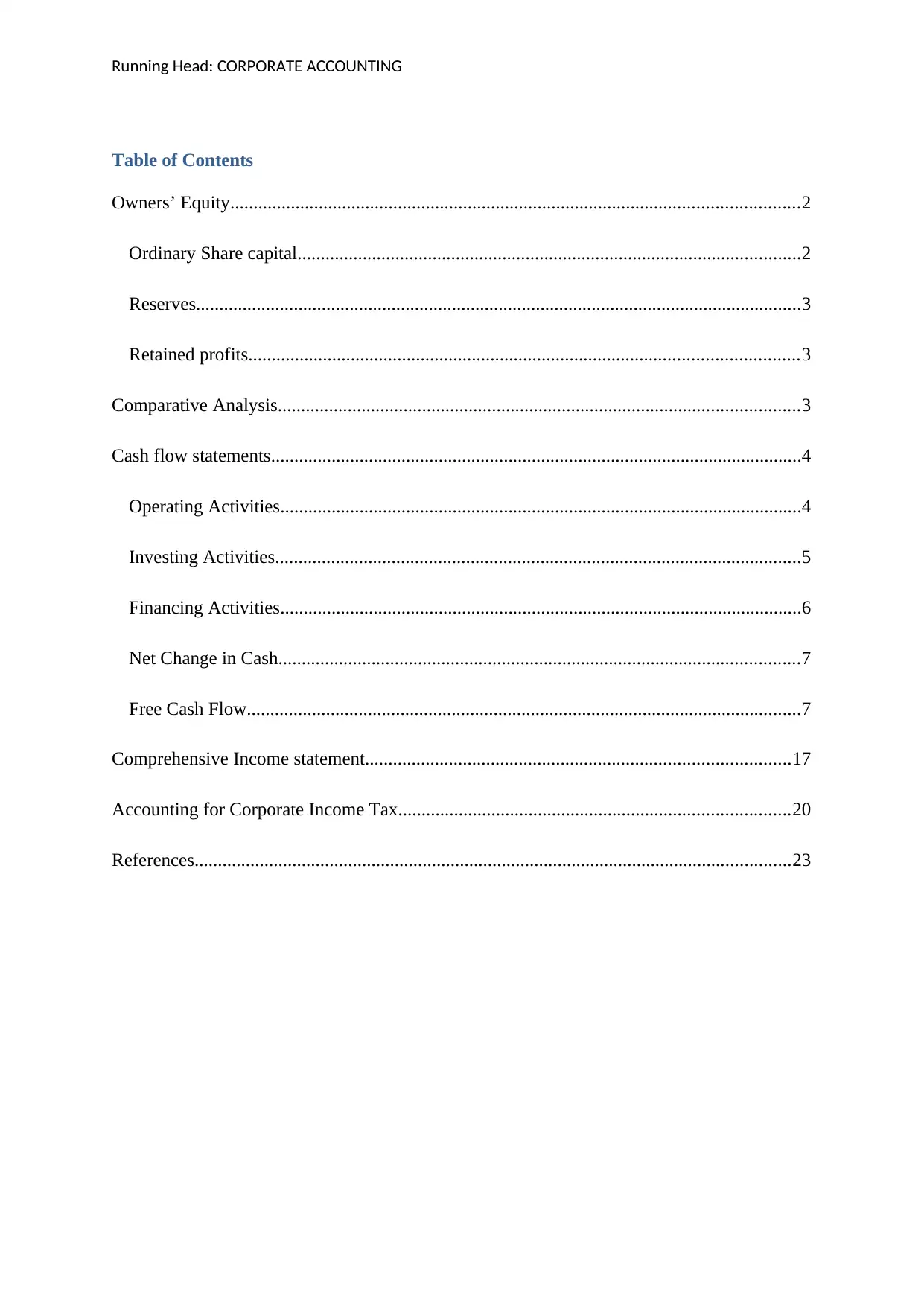
Running Head: CORPORATE ACCOUNTING
Table of Contents
Owners’ Equity..........................................................................................................................2
Ordinary Share capital............................................................................................................2
Reserves..................................................................................................................................3
Retained profits......................................................................................................................3
Comparative Analysis................................................................................................................3
Cash flow statements..................................................................................................................4
Operating Activities................................................................................................................4
Investing Activities.................................................................................................................5
Financing Activities................................................................................................................6
Net Change in Cash................................................................................................................7
Free Cash Flow.......................................................................................................................7
Comprehensive Income statement...........................................................................................17
Accounting for Corporate Income Tax....................................................................................20
References................................................................................................................................23
Table of Contents
Owners’ Equity..........................................................................................................................2
Ordinary Share capital............................................................................................................2
Reserves..................................................................................................................................3
Retained profits......................................................................................................................3
Comparative Analysis................................................................................................................3
Cash flow statements..................................................................................................................4
Operating Activities................................................................................................................4
Investing Activities.................................................................................................................5
Financing Activities................................................................................................................6
Net Change in Cash................................................................................................................7
Free Cash Flow.......................................................................................................................7
Comprehensive Income statement...........................................................................................17
Accounting for Corporate Income Tax....................................................................................20
References................................................................................................................................23
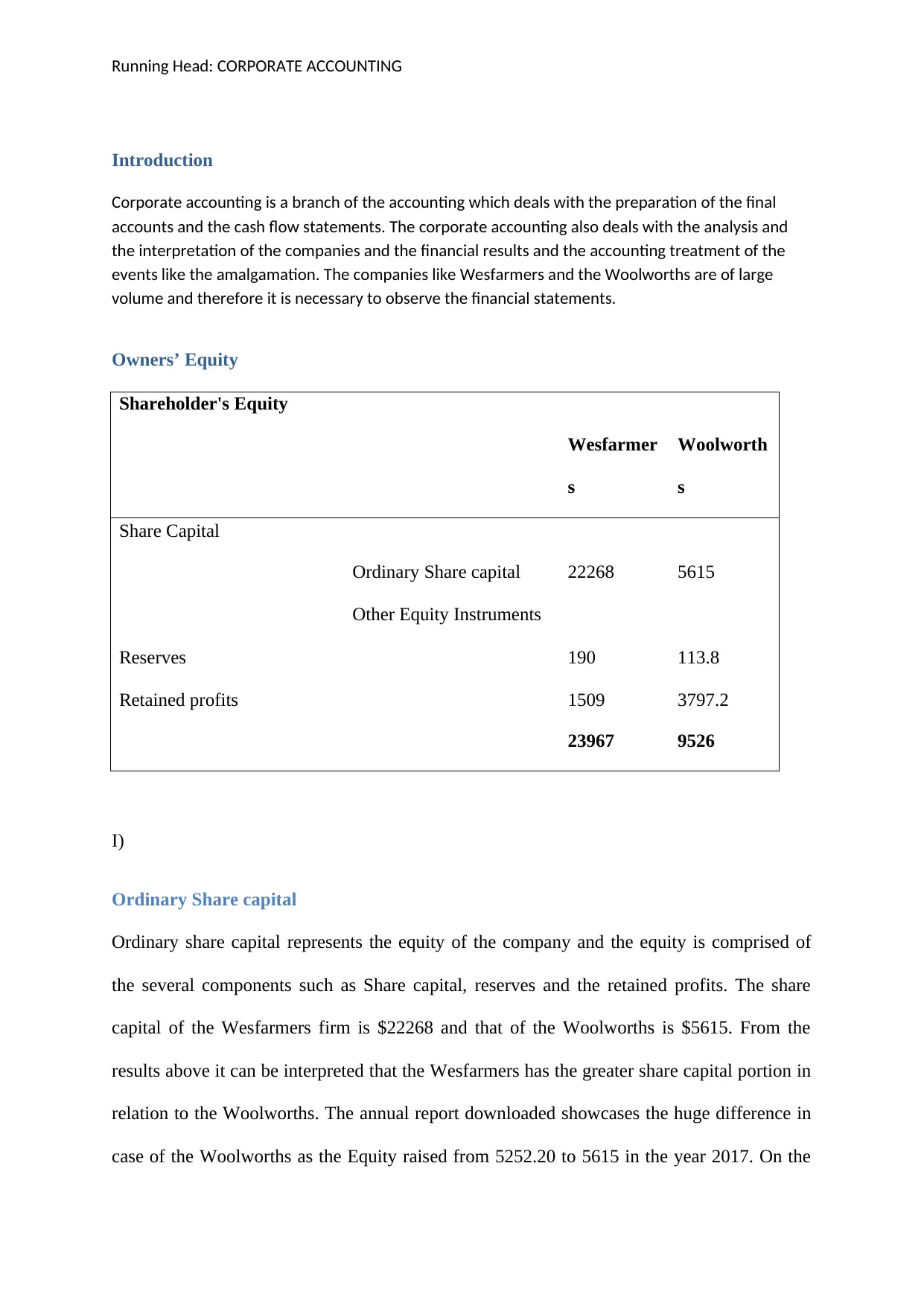
Running Head: CORPORATE ACCOUNTING
Introduction
Corporate accounting is a branch of the accounting which deals with the preparation of the final
accounts and the cash flow statements. The corporate accounting also deals with the analysis and
the interpretation of the companies and the financial results and the accounting treatment of the
events like the amalgamation. The companies like Wesfarmers and the Woolworths are of large
volume and therefore it is necessary to observe the financial statements.
Owners’ Equity
Shareholder's Equity
Wesfarmer
s
Woolworth
s
Share Capital
Ordinary Share capital 22268 5615
Other Equity Instruments
Reserves 190 113.8
Retained profits 1509 3797.2
23967 9526
I)
Ordinary Share capital
Ordinary share capital represents the equity of the company and the equity is comprised of
the several components such as Share capital, reserves and the retained profits. The share
capital of the Wesfarmers firm is $22268 and that of the Woolworths is $5615. From the
results above it can be interpreted that the Wesfarmers has the greater share capital portion in
relation to the Woolworths. The annual report downloaded showcases the huge difference in
case of the Woolworths as the Equity raised from 5252.20 to 5615 in the year 2017. On the
Introduction
Corporate accounting is a branch of the accounting which deals with the preparation of the final
accounts and the cash flow statements. The corporate accounting also deals with the analysis and
the interpretation of the companies and the financial results and the accounting treatment of the
events like the amalgamation. The companies like Wesfarmers and the Woolworths are of large
volume and therefore it is necessary to observe the financial statements.
Owners’ Equity
Shareholder's Equity
Wesfarmer
s
Woolworth
s
Share Capital
Ordinary Share capital 22268 5615
Other Equity Instruments
Reserves 190 113.8
Retained profits 1509 3797.2
23967 9526
I)
Ordinary Share capital
Ordinary share capital represents the equity of the company and the equity is comprised of
the several components such as Share capital, reserves and the retained profits. The share
capital of the Wesfarmers firm is $22268 and that of the Woolworths is $5615. From the
results above it can be interpreted that the Wesfarmers has the greater share capital portion in
relation to the Woolworths. The annual report downloaded showcases the huge difference in
case of the Woolworths as the Equity raised from 5252.20 to 5615 in the year 2017. On the
Secure Best Marks with AI Grader
Need help grading? Try our AI Grader for instant feedback on your assignments.
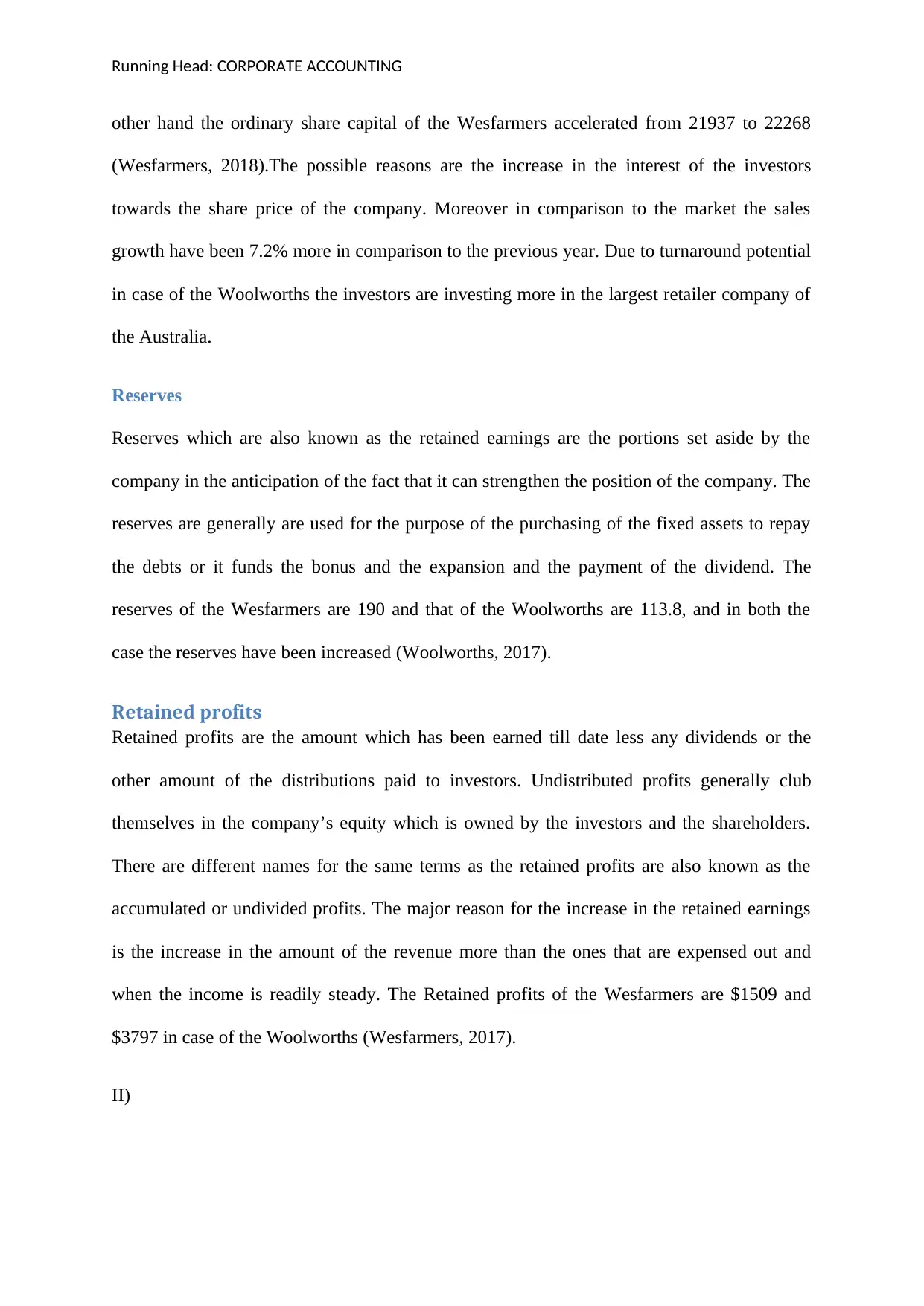
Running Head: CORPORATE ACCOUNTING
other hand the ordinary share capital of the Wesfarmers accelerated from 21937 to 22268
(Wesfarmers, 2018).The possible reasons are the increase in the interest of the investors
towards the share price of the company. Moreover in comparison to the market the sales
growth have been 7.2% more in comparison to the previous year. Due to turnaround potential
in case of the Woolworths the investors are investing more in the largest retailer company of
the Australia.
Reserves
Reserves which are also known as the retained earnings are the portions set aside by the
company in the anticipation of the fact that it can strengthen the position of the company. The
reserves are generally are used for the purpose of the purchasing of the fixed assets to repay
the debts or it funds the bonus and the expansion and the payment of the dividend. The
reserves of the Wesfarmers are 190 and that of the Woolworths are 113.8, and in both the
case the reserves have been increased (Woolworths, 2017).
Retained profits
Retained profits are the amount which has been earned till date less any dividends or the
other amount of the distributions paid to investors. Undistributed profits generally club
themselves in the company’s equity which is owned by the investors and the shareholders.
There are different names for the same terms as the retained profits are also known as the
accumulated or undivided profits. The major reason for the increase in the retained earnings
is the increase in the amount of the revenue more than the ones that are expensed out and
when the income is readily steady. The Retained profits of the Wesfarmers are $1509 and
$3797 in case of the Woolworths (Wesfarmers, 2017).
II)
other hand the ordinary share capital of the Wesfarmers accelerated from 21937 to 22268
(Wesfarmers, 2018).The possible reasons are the increase in the interest of the investors
towards the share price of the company. Moreover in comparison to the market the sales
growth have been 7.2% more in comparison to the previous year. Due to turnaround potential
in case of the Woolworths the investors are investing more in the largest retailer company of
the Australia.
Reserves
Reserves which are also known as the retained earnings are the portions set aside by the
company in the anticipation of the fact that it can strengthen the position of the company. The
reserves are generally are used for the purpose of the purchasing of the fixed assets to repay
the debts or it funds the bonus and the expansion and the payment of the dividend. The
reserves of the Wesfarmers are 190 and that of the Woolworths are 113.8, and in both the
case the reserves have been increased (Woolworths, 2017).
Retained profits
Retained profits are the amount which has been earned till date less any dividends or the
other amount of the distributions paid to investors. Undistributed profits generally club
themselves in the company’s equity which is owned by the investors and the shareholders.
There are different names for the same terms as the retained profits are also known as the
accumulated or undivided profits. The major reason for the increase in the retained earnings
is the increase in the amount of the revenue more than the ones that are expensed out and
when the income is readily steady. The Retained profits of the Wesfarmers are $1509 and
$3797 in case of the Woolworths (Wesfarmers, 2017).
II)
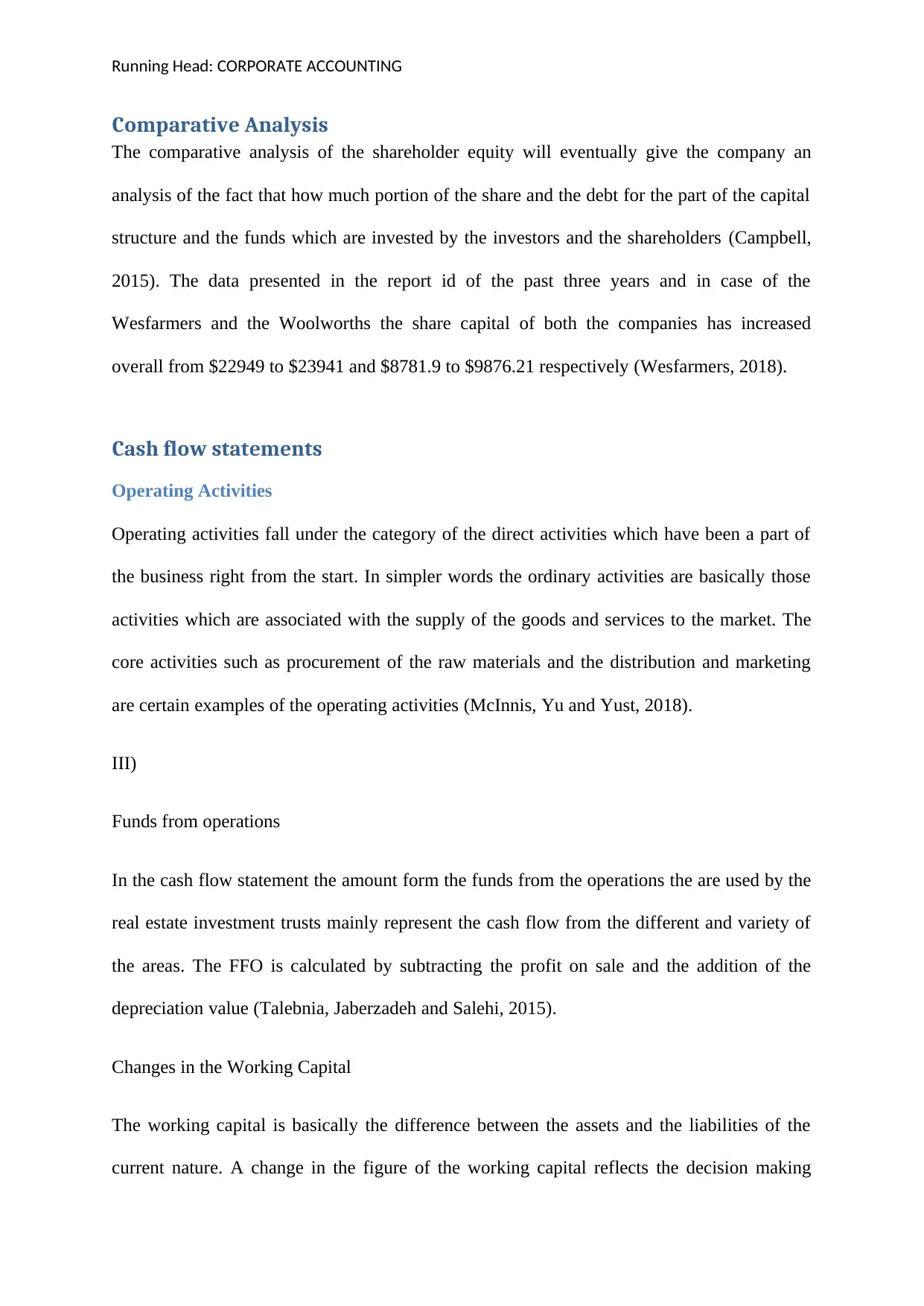
Running Head: CORPORATE ACCOUNTING
Comparative Analysis
The comparative analysis of the shareholder equity will eventually give the company an
analysis of the fact that how much portion of the share and the debt for the part of the capital
structure and the funds which are invested by the investors and the shareholders (Campbell,
2015). The data presented in the report id of the past three years and in case of the
Wesfarmers and the Woolworths the share capital of both the companies has increased
overall from $22949 to $23941 and $8781.9 to $9876.21 respectively (Wesfarmers, 2018).
Cash flow statements
Operating Activities
Operating activities fall under the category of the direct activities which have been a part of
the business right from the start. In simpler words the ordinary activities are basically those
activities which are associated with the supply of the goods and services to the market. The
core activities such as procurement of the raw materials and the distribution and marketing
are certain examples of the operating activities (McInnis, Yu and Yust, 2018).
III)
Funds from operations
In the cash flow statement the amount form the funds from the operations the are used by the
real estate investment trusts mainly represent the cash flow from the different and variety of
the areas. The FFO is calculated by subtracting the profit on sale and the addition of the
depreciation value (Talebnia, Jaberzadeh and Salehi, 2015).
Changes in the Working Capital
The working capital is basically the difference between the assets and the liabilities of the
current nature. A change in the figure of the working capital reflects the decision making
Comparative Analysis
The comparative analysis of the shareholder equity will eventually give the company an
analysis of the fact that how much portion of the share and the debt for the part of the capital
structure and the funds which are invested by the investors and the shareholders (Campbell,
2015). The data presented in the report id of the past three years and in case of the
Wesfarmers and the Woolworths the share capital of both the companies has increased
overall from $22949 to $23941 and $8781.9 to $9876.21 respectively (Wesfarmers, 2018).
Cash flow statements
Operating Activities
Operating activities fall under the category of the direct activities which have been a part of
the business right from the start. In simpler words the ordinary activities are basically those
activities which are associated with the supply of the goods and services to the market. The
core activities such as procurement of the raw materials and the distribution and marketing
are certain examples of the operating activities (McInnis, Yu and Yust, 2018).
III)
Funds from operations
In the cash flow statement the amount form the funds from the operations the are used by the
real estate investment trusts mainly represent the cash flow from the different and variety of
the areas. The FFO is calculated by subtracting the profit on sale and the addition of the
depreciation value (Talebnia, Jaberzadeh and Salehi, 2015).
Changes in the Working Capital
The working capital is basically the difference between the assets and the liabilities of the
current nature. A change in the figure of the working capital reflects the decision making
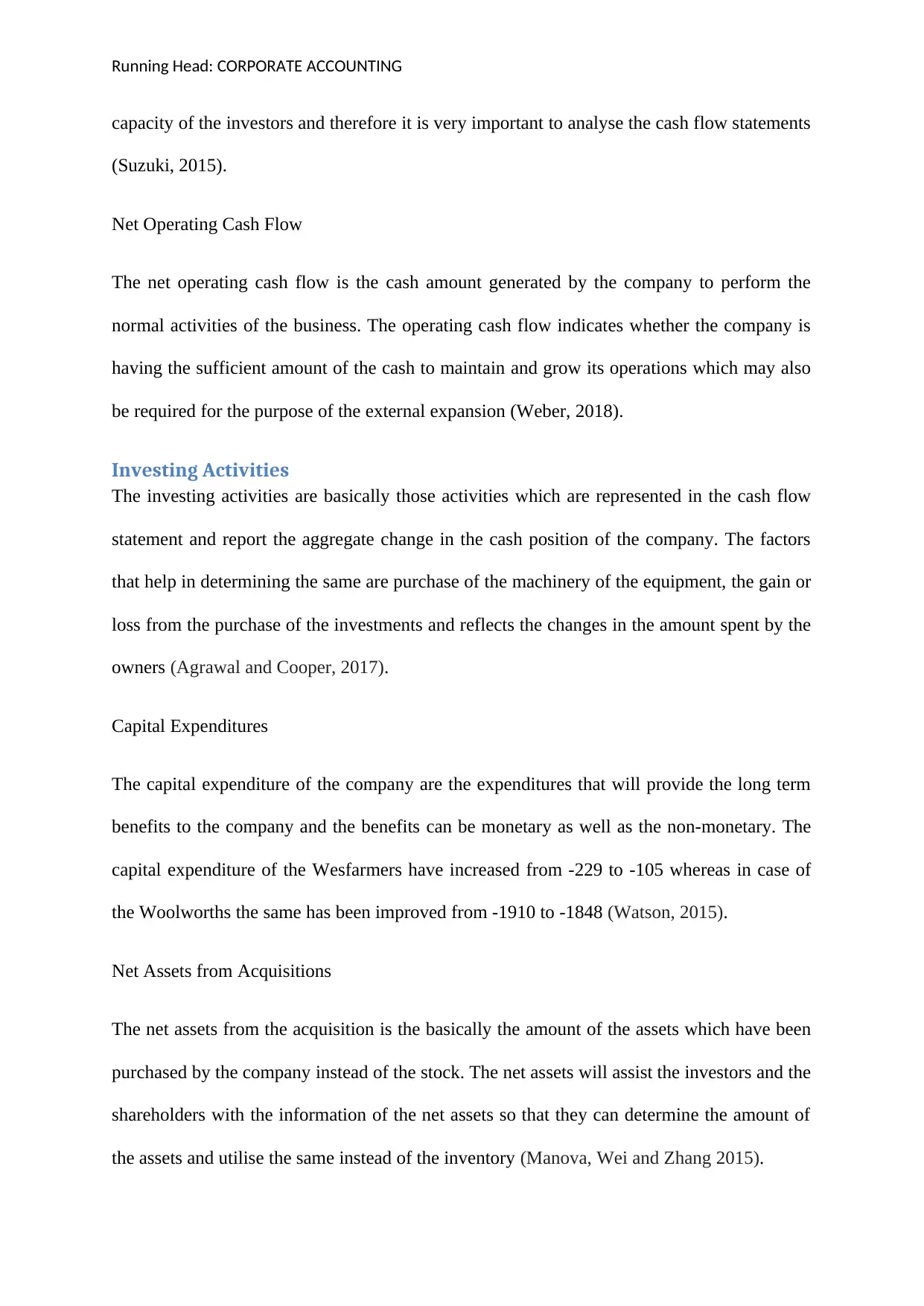
Running Head: CORPORATE ACCOUNTING
capacity of the investors and therefore it is very important to analyse the cash flow statements
(Suzuki, 2015).
Net Operating Cash Flow
The net operating cash flow is the cash amount generated by the company to perform the
normal activities of the business. The operating cash flow indicates whether the company is
having the sufficient amount of the cash to maintain and grow its operations which may also
be required for the purpose of the external expansion (Weber, 2018).
Investing Activities
The investing activities are basically those activities which are represented in the cash flow
statement and report the aggregate change in the cash position of the company. The factors
that help in determining the same are purchase of the machinery of the equipment, the gain or
loss from the purchase of the investments and reflects the changes in the amount spent by the
owners (Agrawal and Cooper, 2017).
Capital Expenditures
The capital expenditure of the company are the expenditures that will provide the long term
benefits to the company and the benefits can be monetary as well as the non-monetary. The
capital expenditure of the Wesfarmers have increased from -229 to -105 whereas in case of
the Woolworths the same has been improved from -1910 to -1848 (Watson, 2015).
Net Assets from Acquisitions
The net assets from the acquisition is the basically the amount of the assets which have been
purchased by the company instead of the stock. The net assets will assist the investors and the
shareholders with the information of the net assets so that they can determine the amount of
the assets and utilise the same instead of the inventory (Manova, Wei and Zhang 2015).
capacity of the investors and therefore it is very important to analyse the cash flow statements
(Suzuki, 2015).
Net Operating Cash Flow
The net operating cash flow is the cash amount generated by the company to perform the
normal activities of the business. The operating cash flow indicates whether the company is
having the sufficient amount of the cash to maintain and grow its operations which may also
be required for the purpose of the external expansion (Weber, 2018).
Investing Activities
The investing activities are basically those activities which are represented in the cash flow
statement and report the aggregate change in the cash position of the company. The factors
that help in determining the same are purchase of the machinery of the equipment, the gain or
loss from the purchase of the investments and reflects the changes in the amount spent by the
owners (Agrawal and Cooper, 2017).
Capital Expenditures
The capital expenditure of the company are the expenditures that will provide the long term
benefits to the company and the benefits can be monetary as well as the non-monetary. The
capital expenditure of the Wesfarmers have increased from -229 to -105 whereas in case of
the Woolworths the same has been improved from -1910 to -1848 (Watson, 2015).
Net Assets from Acquisitions
The net assets from the acquisition is the basically the amount of the assets which have been
purchased by the company instead of the stock. The net assets will assist the investors and the
shareholders with the information of the net assets so that they can determine the amount of
the assets and utilise the same instead of the inventory (Manova, Wei and Zhang 2015).
Paraphrase This Document
Need a fresh take? Get an instant paraphrase of this document with our AI Paraphraser
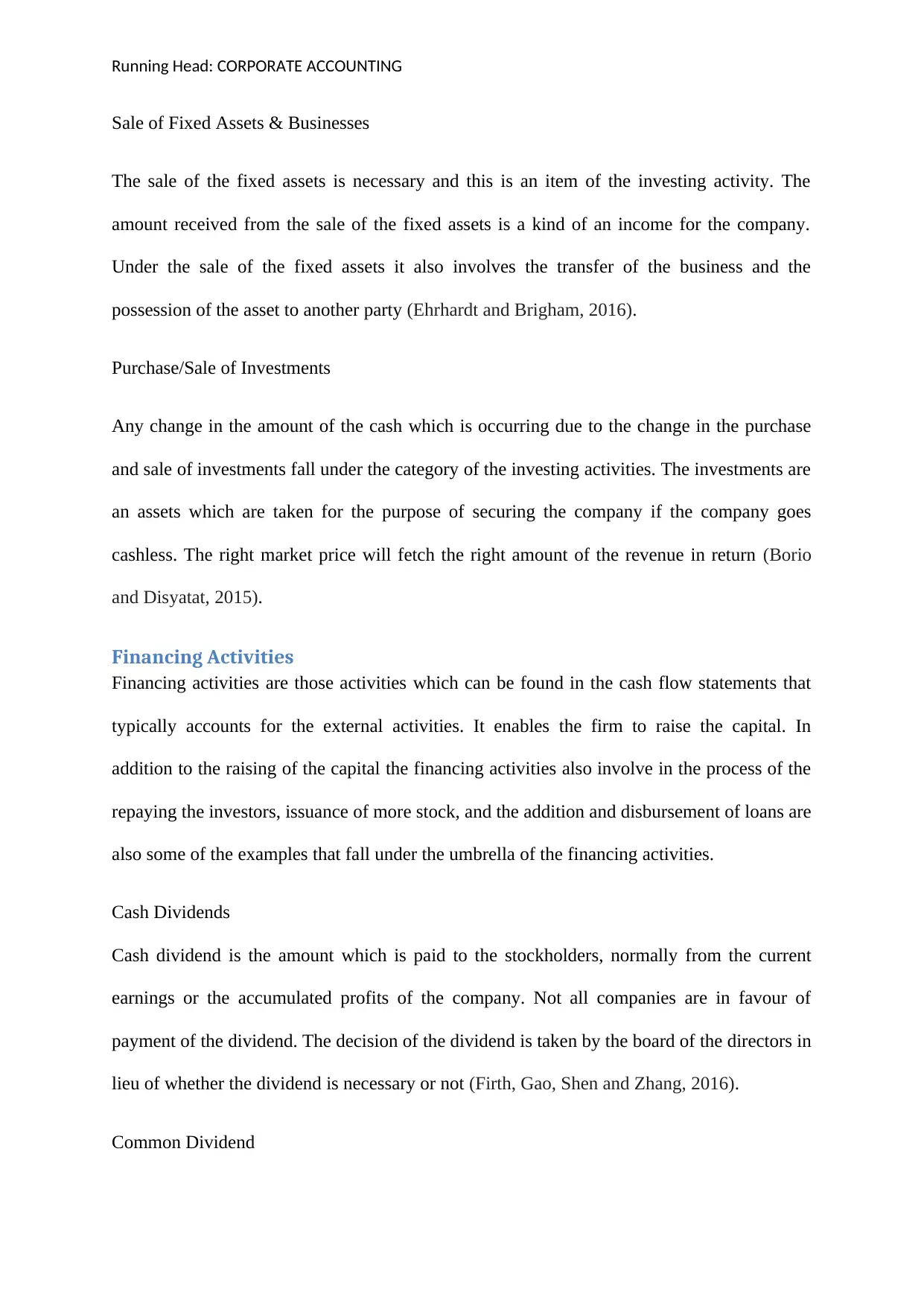
Running Head: CORPORATE ACCOUNTING
Sale of Fixed Assets & Businesses
The sale of the fixed assets is necessary and this is an item of the investing activity. The
amount received from the sale of the fixed assets is a kind of an income for the company.
Under the sale of the fixed assets it also involves the transfer of the business and the
possession of the asset to another party (Ehrhardt and Brigham, 2016).
Purchase/Sale of Investments
Any change in the amount of the cash which is occurring due to the change in the purchase
and sale of investments fall under the category of the investing activities. The investments are
an assets which are taken for the purpose of securing the company if the company goes
cashless. The right market price will fetch the right amount of the revenue in return (Borio
and Disyatat, 2015).
Financing Activities
Financing activities are those activities which can be found in the cash flow statements that
typically accounts for the external activities. It enables the firm to raise the capital. In
addition to the raising of the capital the financing activities also involve in the process of the
repaying the investors, issuance of more stock, and the addition and disbursement of loans are
also some of the examples that fall under the umbrella of the financing activities.
Cash Dividends
Cash dividend is the amount which is paid to the stockholders, normally from the current
earnings or the accumulated profits of the company. Not all companies are in favour of
payment of the dividend. The decision of the dividend is taken by the board of the directors in
lieu of whether the dividend is necessary or not (Firth, Gao, Shen and Zhang, 2016).
Common Dividend
Sale of Fixed Assets & Businesses
The sale of the fixed assets is necessary and this is an item of the investing activity. The
amount received from the sale of the fixed assets is a kind of an income for the company.
Under the sale of the fixed assets it also involves the transfer of the business and the
possession of the asset to another party (Ehrhardt and Brigham, 2016).
Purchase/Sale of Investments
Any change in the amount of the cash which is occurring due to the change in the purchase
and sale of investments fall under the category of the investing activities. The investments are
an assets which are taken for the purpose of securing the company if the company goes
cashless. The right market price will fetch the right amount of the revenue in return (Borio
and Disyatat, 2015).
Financing Activities
Financing activities are those activities which can be found in the cash flow statements that
typically accounts for the external activities. It enables the firm to raise the capital. In
addition to the raising of the capital the financing activities also involve in the process of the
repaying the investors, issuance of more stock, and the addition and disbursement of loans are
also some of the examples that fall under the umbrella of the financing activities.
Cash Dividends
Cash dividend is the amount which is paid to the stockholders, normally from the current
earnings or the accumulated profits of the company. Not all companies are in favour of
payment of the dividend. The decision of the dividend is taken by the board of the directors in
lieu of whether the dividend is necessary or not (Firth, Gao, Shen and Zhang, 2016).
Common Dividend
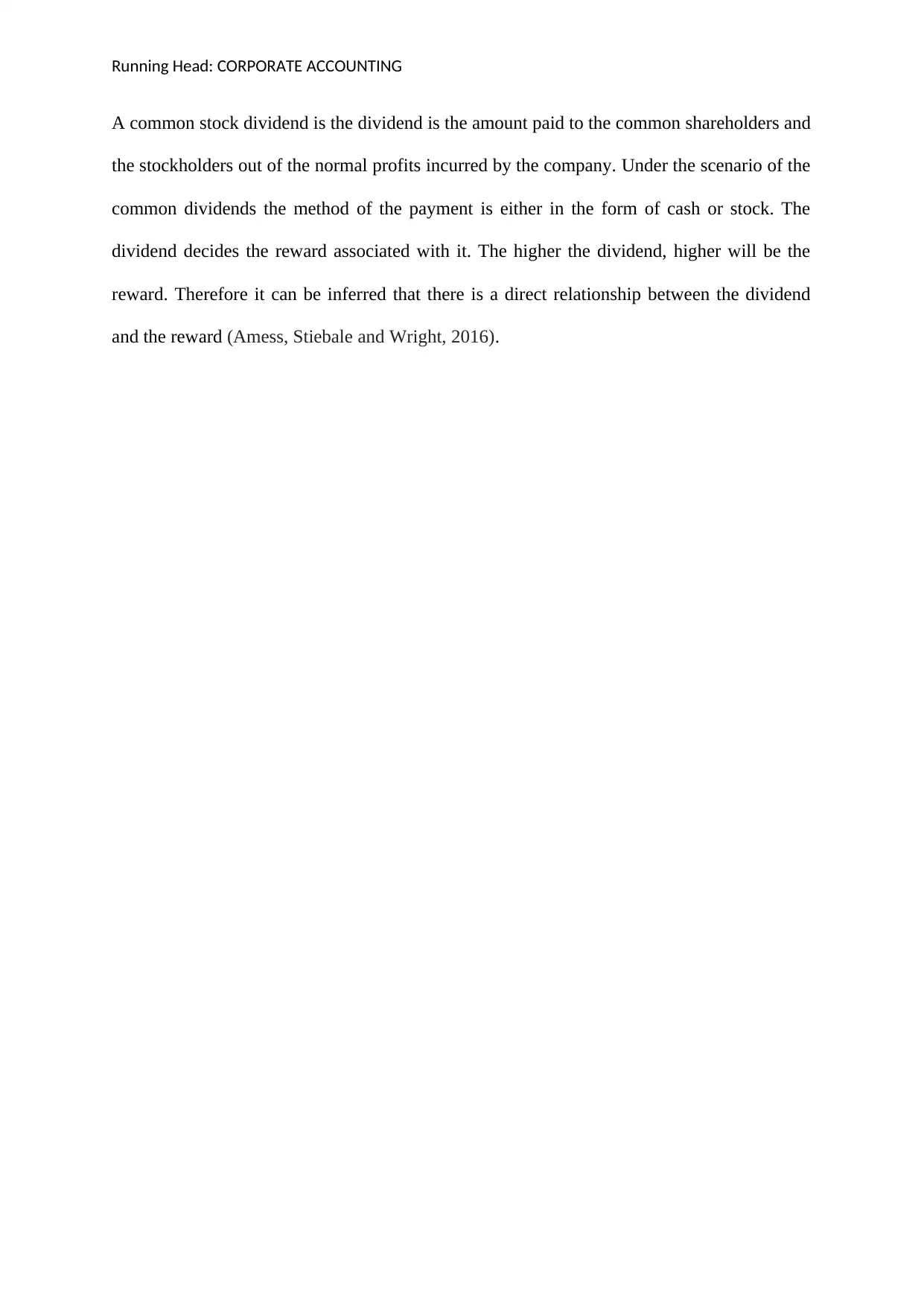
Running Head: CORPORATE ACCOUNTING
A common stock dividend is the dividend is the amount paid to the common shareholders and
the stockholders out of the normal profits incurred by the company. Under the scenario of the
common dividends the method of the payment is either in the form of cash or stock. The
dividend decides the reward associated with it. The higher the dividend, higher will be the
reward. Therefore it can be inferred that there is a direct relationship between the dividend
and the reward (Amess, Stiebale and Wright, 2016).
A common stock dividend is the dividend is the amount paid to the common shareholders and
the stockholders out of the normal profits incurred by the company. Under the scenario of the
common dividends the method of the payment is either in the form of cash or stock. The
dividend decides the reward associated with it. The higher the dividend, higher will be the
reward. Therefore it can be inferred that there is a direct relationship between the dividend
and the reward (Amess, Stiebale and Wright, 2016).
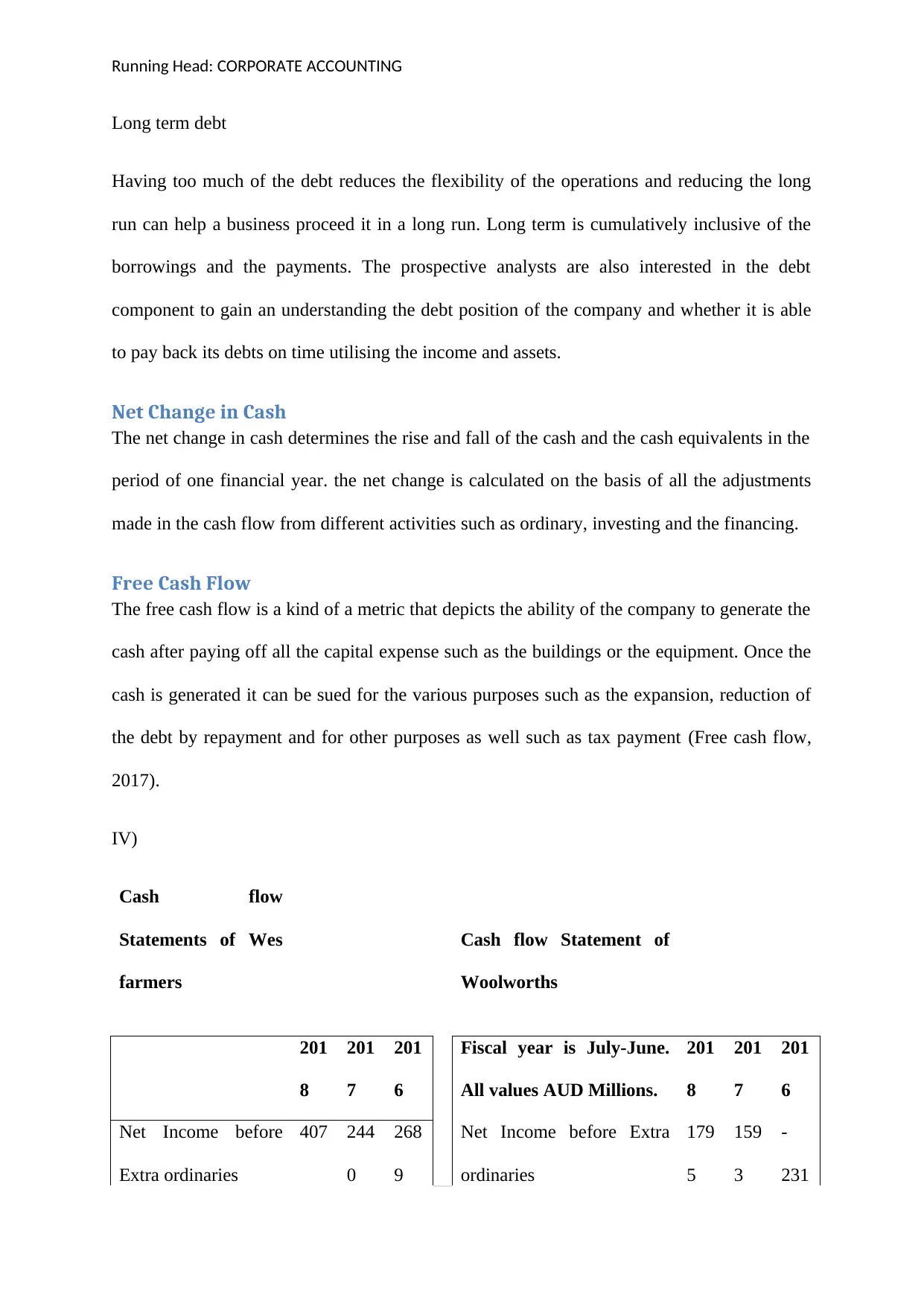
Running Head: CORPORATE ACCOUNTING
Long term debt
Having too much of the debt reduces the flexibility of the operations and reducing the long
run can help a business proceed it in a long run. Long term is cumulatively inclusive of the
borrowings and the payments. The prospective analysts are also interested in the debt
component to gain an understanding the debt position of the company and whether it is able
to pay back its debts on time utilising the income and assets.
Net Change in Cash
The net change in cash determines the rise and fall of the cash and the cash equivalents in the
period of one financial year. the net change is calculated on the basis of all the adjustments
made in the cash flow from different activities such as ordinary, investing and the financing.
Free Cash Flow
The free cash flow is a kind of a metric that depicts the ability of the company to generate the
cash after paying off all the capital expense such as the buildings or the equipment. Once the
cash is generated it can be sued for the various purposes such as the expansion, reduction of
the debt by repayment and for other purposes as well such as tax payment (Free cash flow,
2017).
IV)
Cash flow
Statements of Wes
farmers
Cash flow Statement of
Woolworths
201
8
201
7
201
6
Fiscal year is July-June.
All values AUD Millions.
201
8
201
7
201
6
Net Income before
Extra ordinaries
407 244
0
268
9
Net Income before Extra
ordinaries
179
5
159
3
-
231
Long term debt
Having too much of the debt reduces the flexibility of the operations and reducing the long
run can help a business proceed it in a long run. Long term is cumulatively inclusive of the
borrowings and the payments. The prospective analysts are also interested in the debt
component to gain an understanding the debt position of the company and whether it is able
to pay back its debts on time utilising the income and assets.
Net Change in Cash
The net change in cash determines the rise and fall of the cash and the cash equivalents in the
period of one financial year. the net change is calculated on the basis of all the adjustments
made in the cash flow from different activities such as ordinary, investing and the financing.
Free Cash Flow
The free cash flow is a kind of a metric that depicts the ability of the company to generate the
cash after paying off all the capital expense such as the buildings or the equipment. Once the
cash is generated it can be sued for the various purposes such as the expansion, reduction of
the debt by repayment and for other purposes as well such as tax payment (Free cash flow,
2017).
IV)
Cash flow
Statements of Wes
farmers
Cash flow Statement of
Woolworths
201
8
201
7
201
6
Fiscal year is July-June.
All values AUD Millions.
201
8
201
7
201
6
Net Income before
Extra ordinaries
407 244
0
268
9
Net Income before Extra
ordinaries
179
5
159
3
-
231
Secure Best Marks with AI Grader
Need help grading? Try our AI Grader for instant feedback on your assignments.
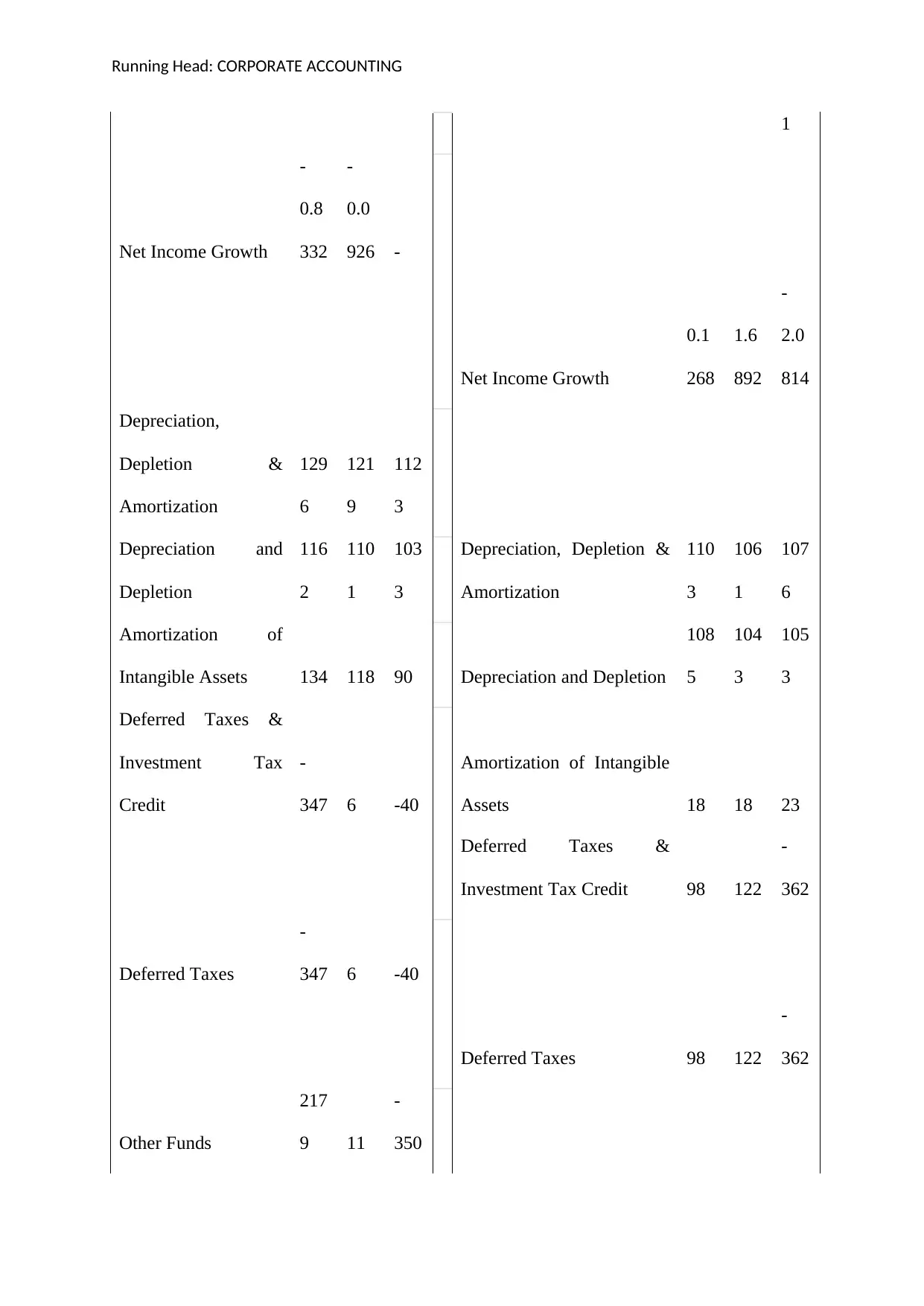
Running Head: CORPORATE ACCOUNTING
1
Net Income Growth
-
0.8
332
-
0.0
926 -
Net Income Growth
0.1
268
1.6
892
-
2.0
814
Depreciation,
Depletion &
Amortization
129
6
121
9
112
3
Depreciation and
Depletion
116
2
110
1
103
3
Depreciation, Depletion &
Amortization
110
3
106
1
107
6
Amortization of
Intangible Assets 134 118 90 Depreciation and Depletion
108
5
104
3
105
3
Deferred Taxes &
Investment Tax
Credit
-
347 6 -40
Amortization of Intangible
Assets 18 18 23
Deferred Taxes &
Investment Tax Credit 98 122
-
362
Deferred Taxes
-
347 6 -40
Deferred Taxes 98 122
-
362
Other Funds
217
9 11
-
350
1
Net Income Growth
-
0.8
332
-
0.0
926 -
Net Income Growth
0.1
268
1.6
892
-
2.0
814
Depreciation,
Depletion &
Amortization
129
6
121
9
112
3
Depreciation and
Depletion
116
2
110
1
103
3
Depreciation, Depletion &
Amortization
110
3
106
1
107
6
Amortization of
Intangible Assets 134 118 90 Depreciation and Depletion
108
5
104
3
105
3
Deferred Taxes &
Investment Tax
Credit
-
347 6 -40
Amortization of Intangible
Assets 18 18 23
Deferred Taxes &
Investment Tax Credit 98 122
-
362
Deferred Taxes
-
347 6 -40
Deferred Taxes 98 122
-
362
Other Funds
217
9 11
-
350
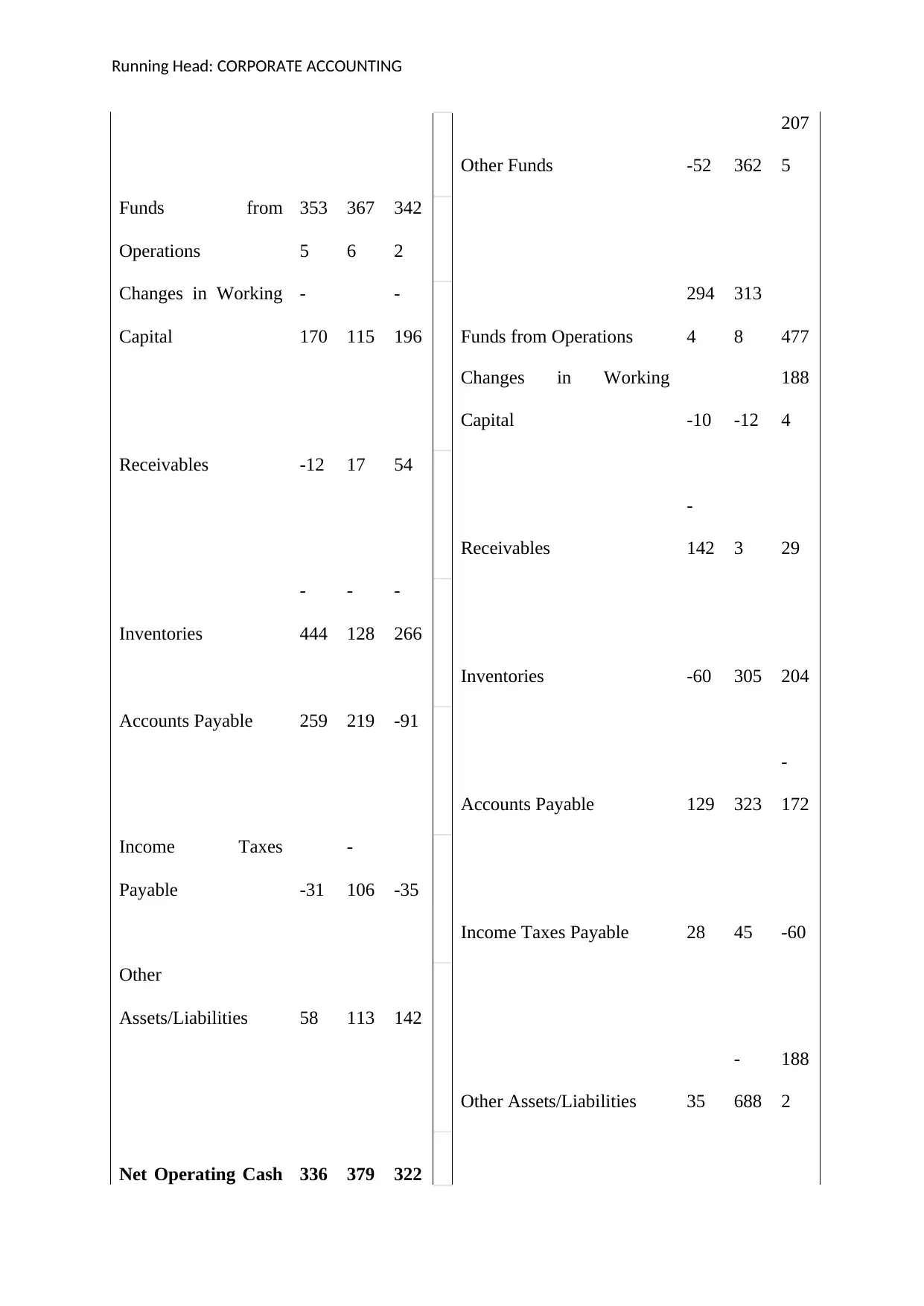
Running Head: CORPORATE ACCOUNTING
Other Funds -52 362
207
5
Funds from
Operations
353
5
367
6
342
2
Changes in Working
Capital
-
170 115
-
196 Funds from Operations
294
4
313
8 477
Changes in Working
Capital -10 -12
188
4
Receivables -12 17 54
Receivables
-
142 3 29
Inventories
-
444
-
128
-
266
Inventories -60 305 204
Accounts Payable 259 219 -91
Accounts Payable 129 323
-
172
Income Taxes
Payable -31
-
106 -35
Income Taxes Payable 28 45 -60
Other
Assets/Liabilities 58 113 142
Other Assets/Liabilities 35
-
688
188
2
Net Operating Cash 336 379 322
Other Funds -52 362
207
5
Funds from
Operations
353
5
367
6
342
2
Changes in Working
Capital
-
170 115
-
196 Funds from Operations
294
4
313
8 477
Changes in Working
Capital -10 -12
188
4
Receivables -12 17 54
Receivables
-
142 3 29
Inventories
-
444
-
128
-
266
Inventories -60 305 204
Accounts Payable 259 219 -91
Accounts Payable 129 323
-
172
Income Taxes
Payable -31
-
106 -35
Income Taxes Payable 28 45 -60
Other
Assets/Liabilities 58 113 142
Other Assets/Liabilities 35
-
688
188
2
Net Operating Cash 336 379 322
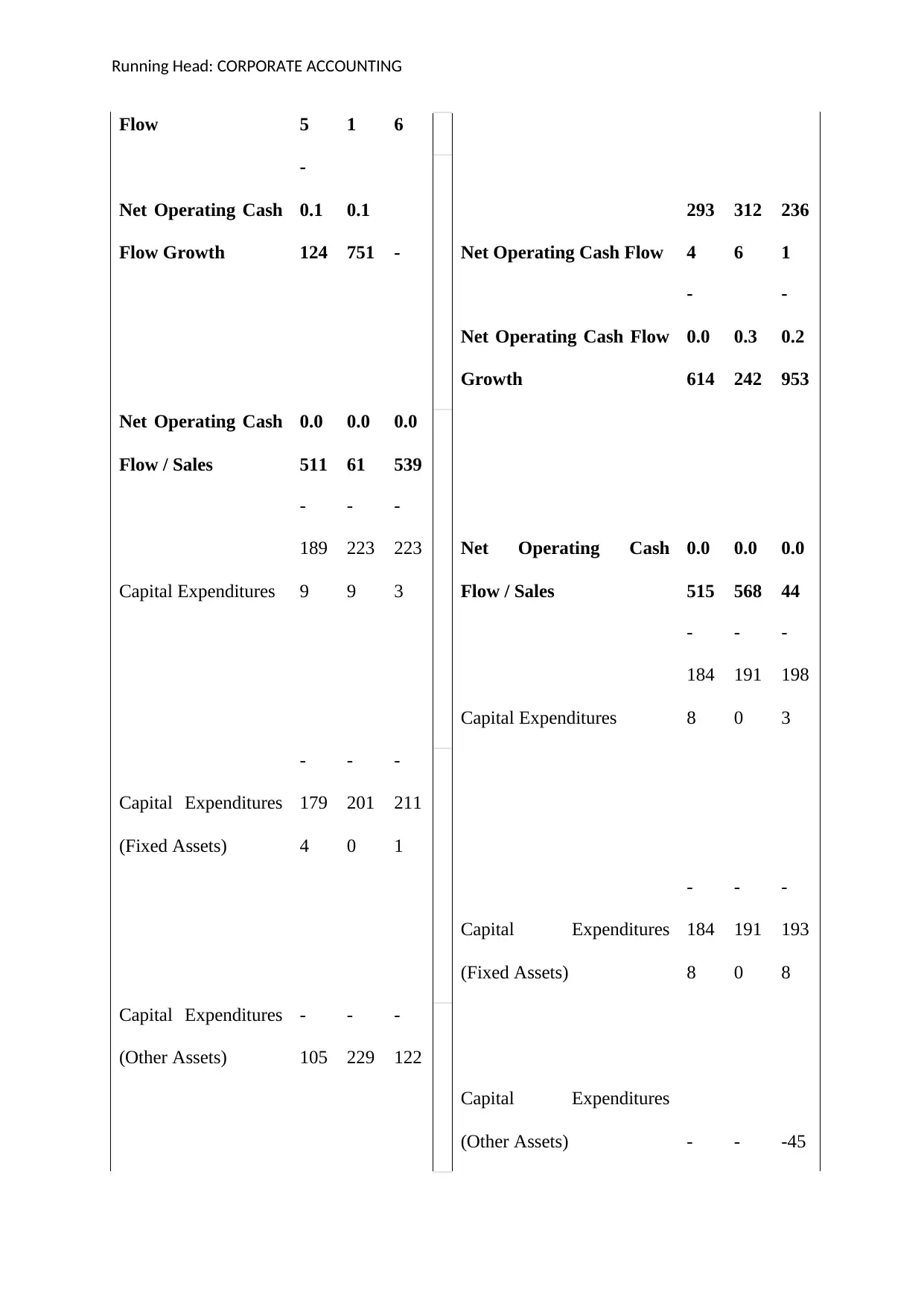
Running Head: CORPORATE ACCOUNTING
Flow 5 1 6
Net Operating Cash
Flow Growth
-
0.1
124
0.1
751 - Net Operating Cash Flow
293
4
312
6
236
1
Net Operating Cash Flow
Growth
-
0.0
614
0.3
242
-
0.2
953
Net Operating Cash
Flow / Sales
0.0
511
0.0
61
0.0
539
Capital Expenditures
-
189
9
-
223
9
-
223
3
Net Operating Cash
Flow / Sales
0.0
515
0.0
568
0.0
44
Capital Expenditures
-
184
8
-
191
0
-
198
3
Capital Expenditures
(Fixed Assets)
-
179
4
-
201
0
-
211
1
Capital Expenditures
(Fixed Assets)
-
184
8
-
191
0
-
193
8
Capital Expenditures
(Other Assets)
-
105
-
229
-
122
Capital Expenditures
(Other Assets) - - -45
Flow 5 1 6
Net Operating Cash
Flow Growth
-
0.1
124
0.1
751 - Net Operating Cash Flow
293
4
312
6
236
1
Net Operating Cash Flow
Growth
-
0.0
614
0.3
242
-
0.2
953
Net Operating Cash
Flow / Sales
0.0
511
0.0
61
0.0
539
Capital Expenditures
-
189
9
-
223
9
-
223
3
Net Operating Cash
Flow / Sales
0.0
515
0.0
568
0.0
44
Capital Expenditures
-
184
8
-
191
0
-
198
3
Capital Expenditures
(Fixed Assets)
-
179
4
-
201
0
-
211
1
Capital Expenditures
(Fixed Assets)
-
184
8
-
191
0
-
193
8
Capital Expenditures
(Other Assets)
-
105
-
229
-
122
Capital Expenditures
(Other Assets) - - -45
Paraphrase This Document
Need a fresh take? Get an instant paraphrase of this document with our AI Paraphraser
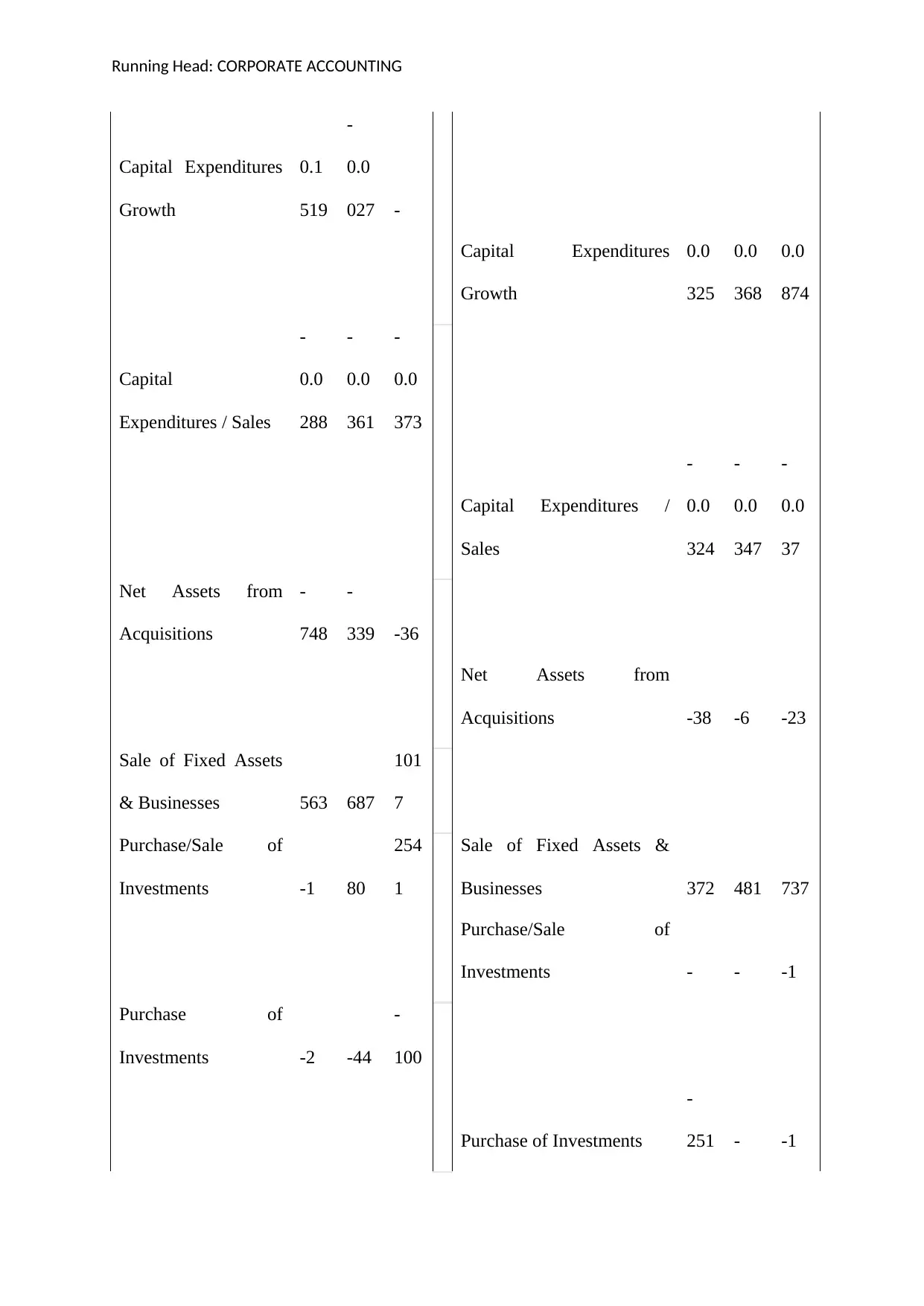
Running Head: CORPORATE ACCOUNTING
Capital Expenditures
Growth
0.1
519
-
0.0
027 -
Capital Expenditures
Growth
0.0
325
0.0
368
0.0
874
Capital
Expenditures / Sales
-
0.0
288
-
0.0
361
-
0.0
373
Capital Expenditures /
Sales
-
0.0
324
-
0.0
347
-
0.0
37
Net Assets from
Acquisitions
-
748
-
339 -36
Net Assets from
Acquisitions -38 -6 -23
Sale of Fixed Assets
& Businesses 563 687
101
7
Purchase/Sale of
Investments -1 80
254
1
Sale of Fixed Assets &
Businesses 372 481 737
Purchase/Sale of
Investments - - -1
Purchase of
Investments -2 -44
-
100
Purchase of Investments
-
251 - -1
Capital Expenditures
Growth
0.1
519
-
0.0
027 -
Capital Expenditures
Growth
0.0
325
0.0
368
0.0
874
Capital
Expenditures / Sales
-
0.0
288
-
0.0
361
-
0.0
373
Capital Expenditures /
Sales
-
0.0
324
-
0.0
347
-
0.0
37
Net Assets from
Acquisitions
-
748
-
339 -36
Net Assets from
Acquisitions -38 -6 -23
Sale of Fixed Assets
& Businesses 563 687
101
7
Purchase/Sale of
Investments -1 80
254
1
Sale of Fixed Assets &
Businesses 372 481 737
Purchase/Sale of
Investments - - -1
Purchase of
Investments -2 -44
-
100
Purchase of Investments
-
251 - -1
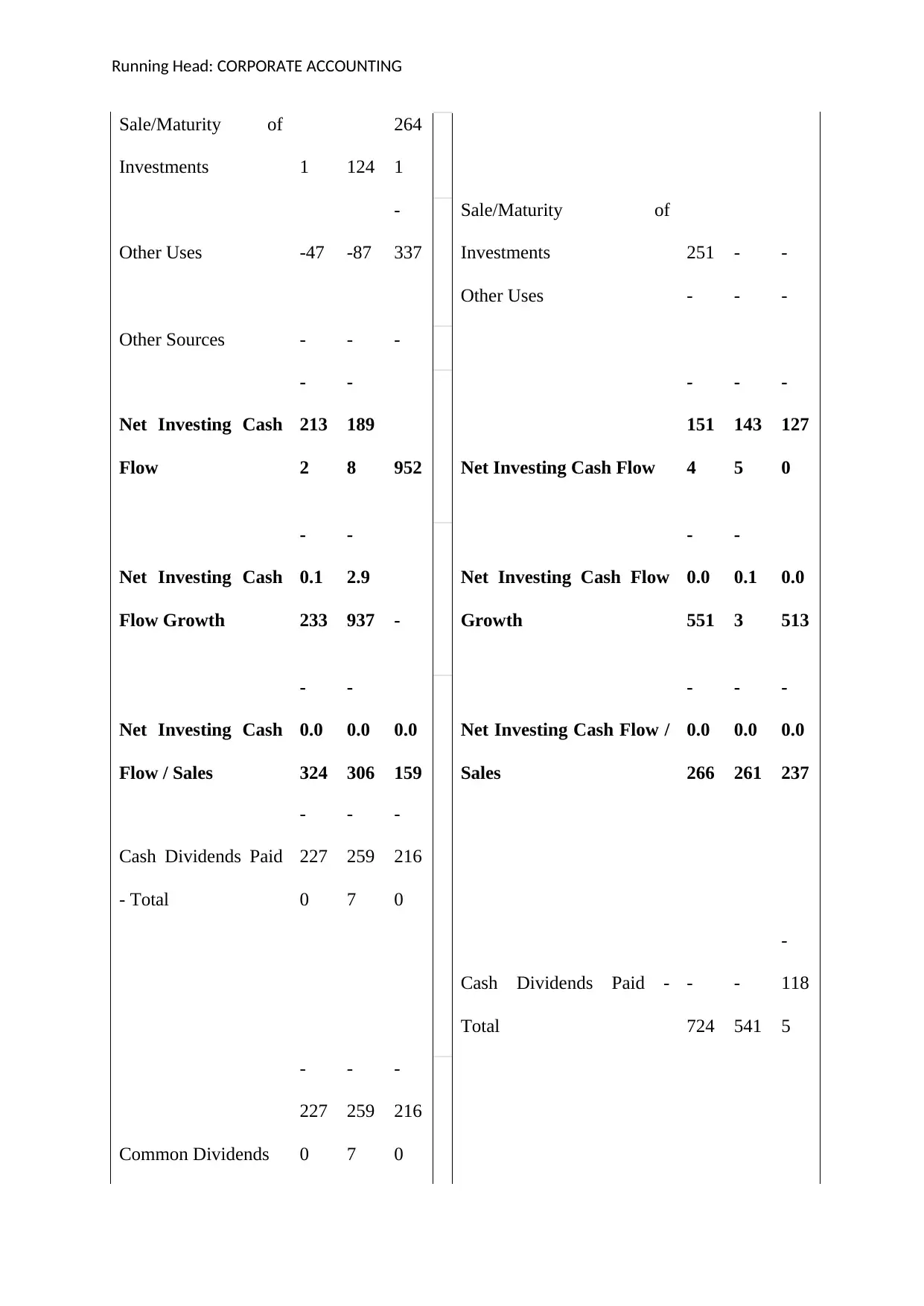
Running Head: CORPORATE ACCOUNTING
Sale/Maturity of
Investments 1 124
264
1
Other Uses -47 -87
-
337
Sale/Maturity of
Investments 251 - -
Other Uses - - -
Other Sources - - -
Net Investing Cash
Flow
-
213
2
-
189
8 952 Net Investing Cash Flow
-
151
4
-
143
5
-
127
0
Net Investing Cash
Flow Growth
-
0.1
233
-
2.9
937 -
Net Investing Cash Flow
Growth
-
0.0
551
-
0.1
3
0.0
513
Net Investing Cash
Flow / Sales
-
0.0
324
-
0.0
306
0.0
159
Net Investing Cash Flow /
Sales
-
0.0
266
-
0.0
261
-
0.0
237
Cash Dividends Paid
- Total
-
227
0
-
259
7
-
216
0
Cash Dividends Paid -
Total
-
724
-
541
-
118
5
Common Dividends
-
227
0
-
259
7
-
216
0
Sale/Maturity of
Investments 1 124
264
1
Other Uses -47 -87
-
337
Sale/Maturity of
Investments 251 - -
Other Uses - - -
Other Sources - - -
Net Investing Cash
Flow
-
213
2
-
189
8 952 Net Investing Cash Flow
-
151
4
-
143
5
-
127
0
Net Investing Cash
Flow Growth
-
0.1
233
-
2.9
937 -
Net Investing Cash Flow
Growth
-
0.0
551
-
0.1
3
0.0
513
Net Investing Cash
Flow / Sales
-
0.0
324
-
0.0
306
0.0
159
Net Investing Cash Flow /
Sales
-
0.0
266
-
0.0
261
-
0.0
237
Cash Dividends Paid
- Total
-
227
0
-
259
7
-
216
0
Cash Dividends Paid -
Total
-
724
-
541
-
118
5
Common Dividends
-
227
0
-
259
7
-
216
0
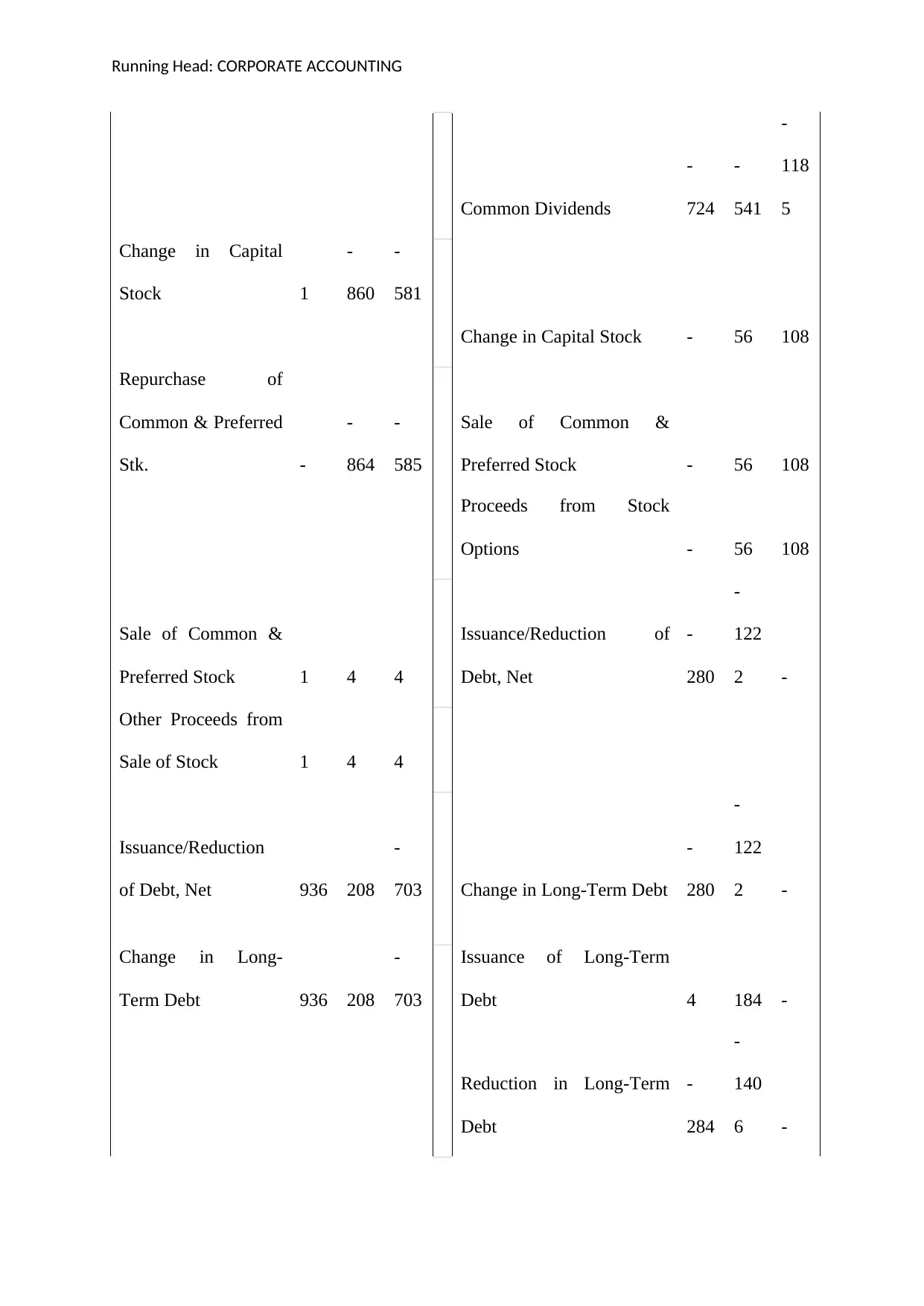
Running Head: CORPORATE ACCOUNTING
Common Dividends
-
724
-
541
-
118
5
Change in Capital
Stock 1
-
860
-
581
Change in Capital Stock - 56 108
Repurchase of
Common & Preferred
Stk. -
-
864
-
585
Sale of Common &
Preferred Stock - 56 108
Proceeds from Stock
Options - 56 108
Sale of Common &
Preferred Stock 1 4 4
Issuance/Reduction of
Debt, Net
-
280
-
122
2 -
Other Proceeds from
Sale of Stock 1 4 4
Issuance/Reduction
of Debt, Net 936 208
-
703 Change in Long-Term Debt
-
280
-
122
2 -
Change in Long-
Term Debt 936 208
-
703
Issuance of Long-Term
Debt 4 184 -
Reduction in Long-Term
Debt
-
284
-
140
6 -
Common Dividends
-
724
-
541
-
118
5
Change in Capital
Stock 1
-
860
-
581
Change in Capital Stock - 56 108
Repurchase of
Common & Preferred
Stk. -
-
864
-
585
Sale of Common &
Preferred Stock - 56 108
Proceeds from Stock
Options - 56 108
Sale of Common &
Preferred Stock 1 4 4
Issuance/Reduction of
Debt, Net
-
280
-
122
2 -
Other Proceeds from
Sale of Stock 1 4 4
Issuance/Reduction
of Debt, Net 936 208
-
703 Change in Long-Term Debt
-
280
-
122
2 -
Change in Long-
Term Debt 936 208
-
703
Issuance of Long-Term
Debt 4 184 -
Reduction in Long-Term
Debt
-
284
-
140
6 -
Secure Best Marks with AI Grader
Need help grading? Try our AI Grader for instant feedback on your assignments.
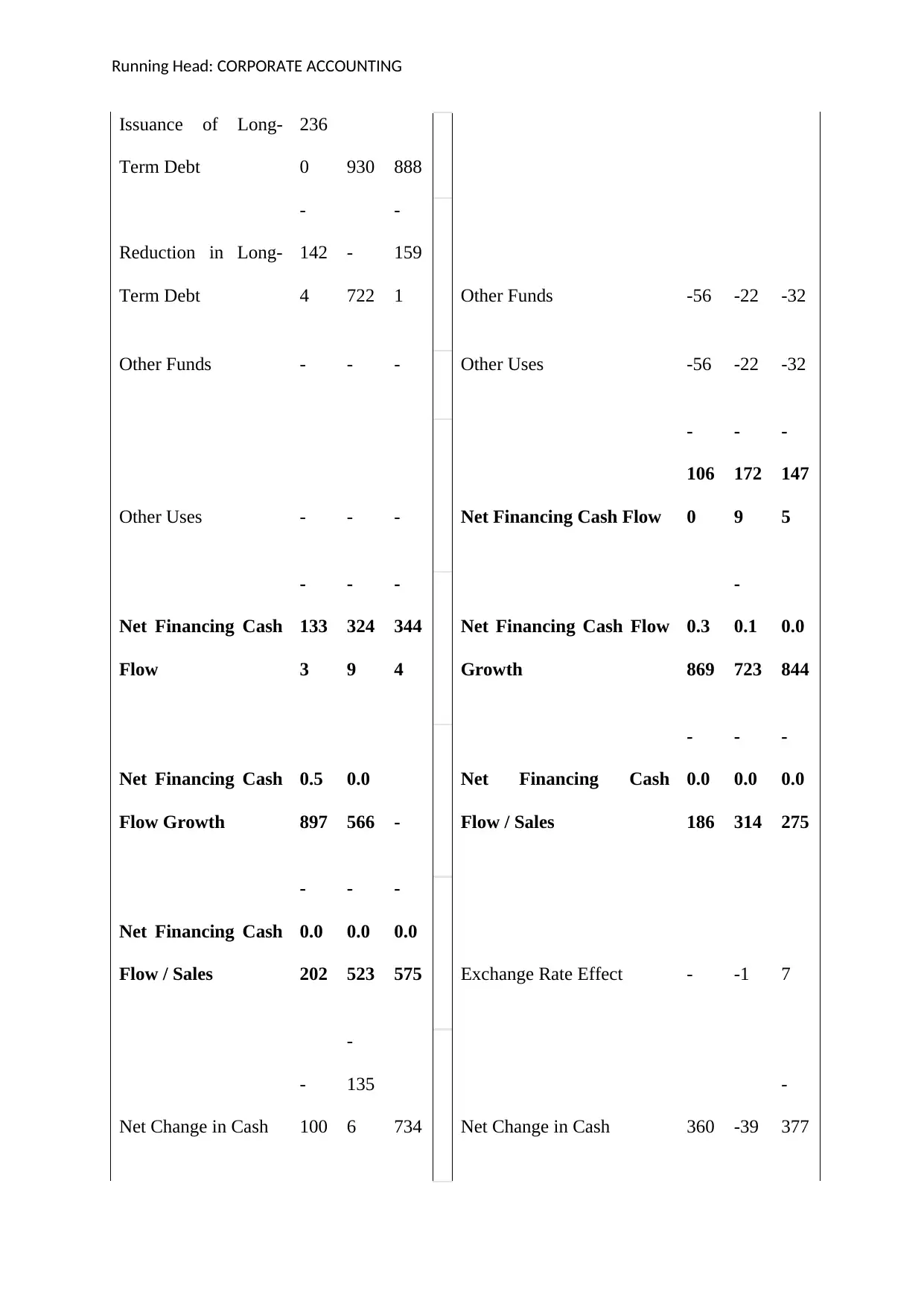
Running Head: CORPORATE ACCOUNTING
Issuance of Long-
Term Debt
236
0 930 888
Reduction in Long-
Term Debt
-
142
4
-
722
-
159
1 Other Funds -56 -22 -32
Other Funds - - - Other Uses -56 -22 -32
Other Uses - - - Net Financing Cash Flow
-
106
0
-
172
9
-
147
5
Net Financing Cash
Flow
-
133
3
-
324
9
-
344
4
Net Financing Cash Flow
Growth
0.3
869
-
0.1
723
0.0
844
Net Financing Cash
Flow Growth
0.5
897
0.0
566 -
Net Financing Cash
Flow / Sales
-
0.0
186
-
0.0
314
-
0.0
275
Net Financing Cash
Flow / Sales
-
0.0
202
-
0.0
523
-
0.0
575 Exchange Rate Effect - -1 7
Net Change in Cash
-
100
-
135
6 734 Net Change in Cash 360 -39
-
377
Issuance of Long-
Term Debt
236
0 930 888
Reduction in Long-
Term Debt
-
142
4
-
722
-
159
1 Other Funds -56 -22 -32
Other Funds - - - Other Uses -56 -22 -32
Other Uses - - - Net Financing Cash Flow
-
106
0
-
172
9
-
147
5
Net Financing Cash
Flow
-
133
3
-
324
9
-
344
4
Net Financing Cash Flow
Growth
0.3
869
-
0.1
723
0.0
844
Net Financing Cash
Flow Growth
0.5
897
0.0
566 -
Net Financing Cash
Flow / Sales
-
0.0
186
-
0.0
314
-
0.0
275
Net Financing Cash
Flow / Sales
-
0.0
202
-
0.0
523
-
0.0
575 Exchange Rate Effect - -1 7
Net Change in Cash
-
100
-
135
6 734 Net Change in Cash 360 -39
-
377
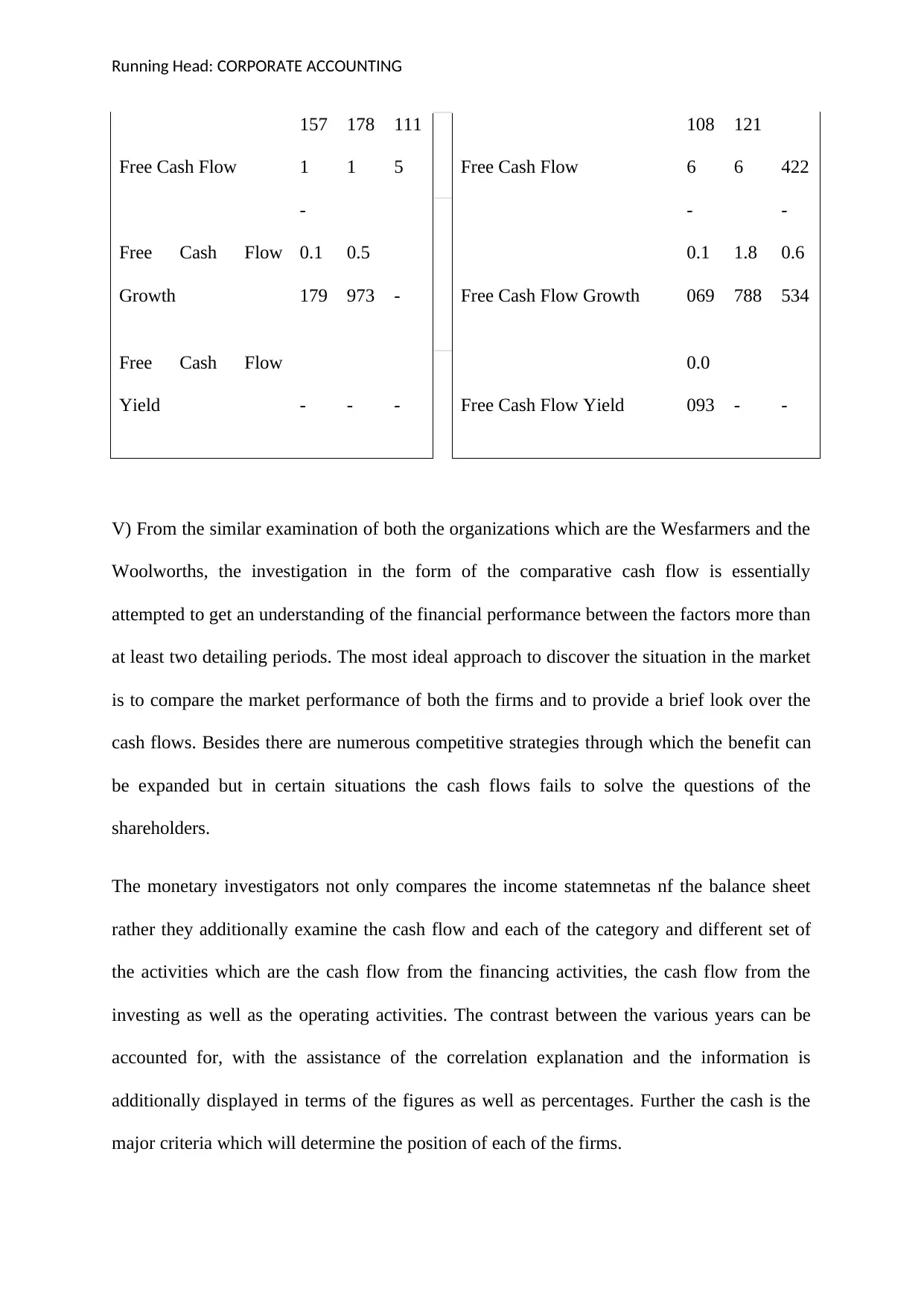
Running Head: CORPORATE ACCOUNTING
Free Cash Flow
157
1
178
1
111
5 Free Cash Flow
108
6
121
6 422
Free Cash Flow
Growth
-
0.1
179
0.5
973 - Free Cash Flow Growth
-
0.1
069
1.8
788
-
0.6
534
Free Cash Flow
Yield - - - Free Cash Flow Yield
0.0
093 - -
V) From the similar examination of both the organizations which are the Wesfarmers and the
Woolworths, the investigation in the form of the comparative cash flow is essentially
attempted to get an understanding of the financial performance between the factors more than
at least two detailing periods. The most ideal approach to discover the situation in the market
is to compare the market performance of both the firms and to provide a brief look over the
cash flows. Besides there are numerous competitive strategies through which the benefit can
be expanded but in certain situations the cash flows fails to solve the questions of the
shareholders.
The monetary investigators not only compares the income statemnetas nf the balance sheet
rather they additionally examine the cash flow and each of the category and different set of
the activities which are the cash flow from the financing activities, the cash flow from the
investing as well as the operating activities. The contrast between the various years can be
accounted for, with the assistance of the correlation explanation and the information is
additionally displayed in terms of the figures as well as percentages. Further the cash is the
major criteria which will determine the position of each of the firms.
Free Cash Flow
157
1
178
1
111
5 Free Cash Flow
108
6
121
6 422
Free Cash Flow
Growth
-
0.1
179
0.5
973 - Free Cash Flow Growth
-
0.1
069
1.8
788
-
0.6
534
Free Cash Flow
Yield - - - Free Cash Flow Yield
0.0
093 - -
V) From the similar examination of both the organizations which are the Wesfarmers and the
Woolworths, the investigation in the form of the comparative cash flow is essentially
attempted to get an understanding of the financial performance between the factors more than
at least two detailing periods. The most ideal approach to discover the situation in the market
is to compare the market performance of both the firms and to provide a brief look over the
cash flows. Besides there are numerous competitive strategies through which the benefit can
be expanded but in certain situations the cash flows fails to solve the questions of the
shareholders.
The monetary investigators not only compares the income statemnetas nf the balance sheet
rather they additionally examine the cash flow and each of the category and different set of
the activities which are the cash flow from the financing activities, the cash flow from the
investing as well as the operating activities. The contrast between the various years can be
accounted for, with the assistance of the correlation explanation and the information is
additionally displayed in terms of the figures as well as percentages. Further the cash is the
major criteria which will determine the position of each of the firms.
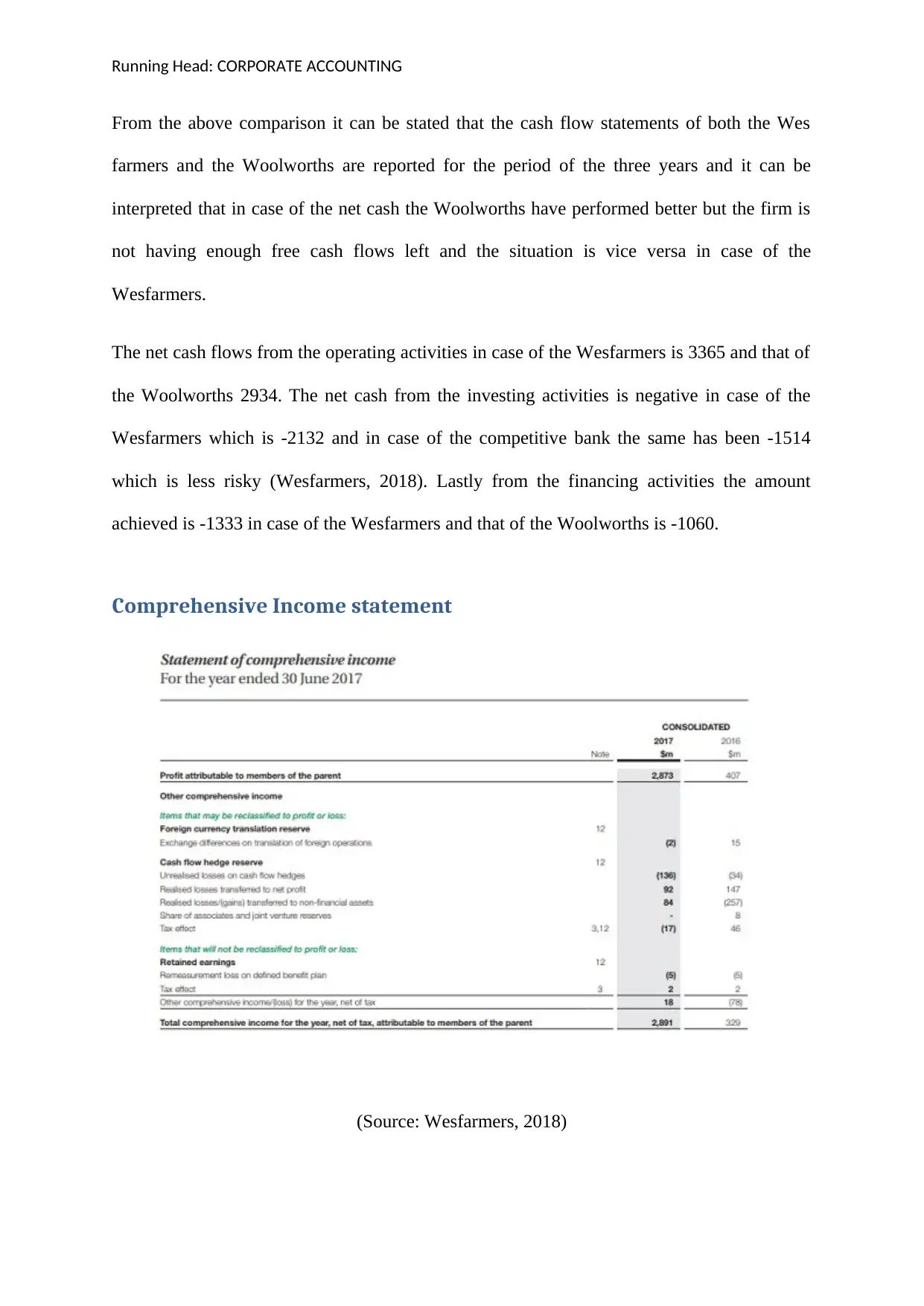
Running Head: CORPORATE ACCOUNTING
From the above comparison it can be stated that the cash flow statements of both the Wes
farmers and the Woolworths are reported for the period of the three years and it can be
interpreted that in case of the net cash the Woolworths have performed better but the firm is
not having enough free cash flows left and the situation is vice versa in case of the
Wesfarmers.
The net cash flows from the operating activities in case of the Wesfarmers is 3365 and that of
the Woolworths 2934. The net cash from the investing activities is negative in case of the
Wesfarmers which is -2132 and in case of the competitive bank the same has been -1514
which is less risky (Wesfarmers, 2018). Lastly from the financing activities the amount
achieved is -1333 in case of the Wesfarmers and that of the Woolworths is -1060.
Comprehensive Income statement
(Source: Wesfarmers, 2018)
From the above comparison it can be stated that the cash flow statements of both the Wes
farmers and the Woolworths are reported for the period of the three years and it can be
interpreted that in case of the net cash the Woolworths have performed better but the firm is
not having enough free cash flows left and the situation is vice versa in case of the
Wesfarmers.
The net cash flows from the operating activities in case of the Wesfarmers is 3365 and that of
the Woolworths 2934. The net cash from the investing activities is negative in case of the
Wesfarmers which is -2132 and in case of the competitive bank the same has been -1514
which is less risky (Wesfarmers, 2018). Lastly from the financing activities the amount
achieved is -1333 in case of the Wesfarmers and that of the Woolworths is -1060.
Comprehensive Income statement
(Source: Wesfarmers, 2018)
Paraphrase This Document
Need a fresh take? Get an instant paraphrase of this document with our AI Paraphraser
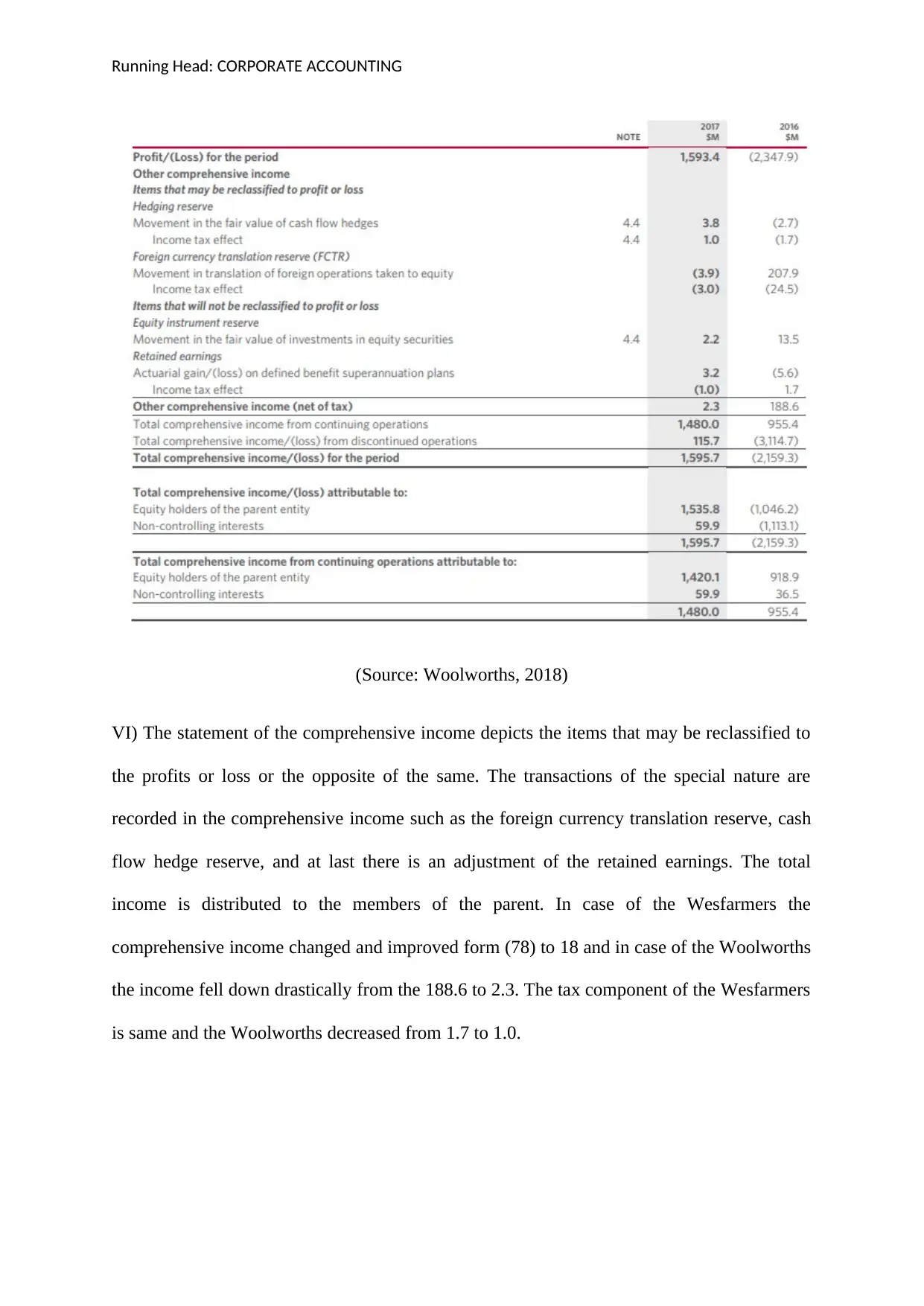
Running Head: CORPORATE ACCOUNTING
(Source: Woolworths, 2018)
VI) The statement of the comprehensive income depicts the items that may be reclassified to
the profits or loss or the opposite of the same. The transactions of the special nature are
recorded in the comprehensive income such as the foreign currency translation reserve, cash
flow hedge reserve, and at last there is an adjustment of the retained earnings. The total
income is distributed to the members of the parent. In case of the Wesfarmers the
comprehensive income changed and improved form (78) to 18 and in case of the Woolworths
the income fell down drastically from the 188.6 to 2.3. The tax component of the Wesfarmers
is same and the Woolworths decreased from 1.7 to 1.0.
(Source: Woolworths, 2018)
VI) The statement of the comprehensive income depicts the items that may be reclassified to
the profits or loss or the opposite of the same. The transactions of the special nature are
recorded in the comprehensive income such as the foreign currency translation reserve, cash
flow hedge reserve, and at last there is an adjustment of the retained earnings. The total
income is distributed to the members of the parent. In case of the Wesfarmers the
comprehensive income changed and improved form (78) to 18 and in case of the Woolworths
the income fell down drastically from the 188.6 to 2.3. The tax component of the Wesfarmers
is same and the Woolworths decreased from 1.7 to 1.0.
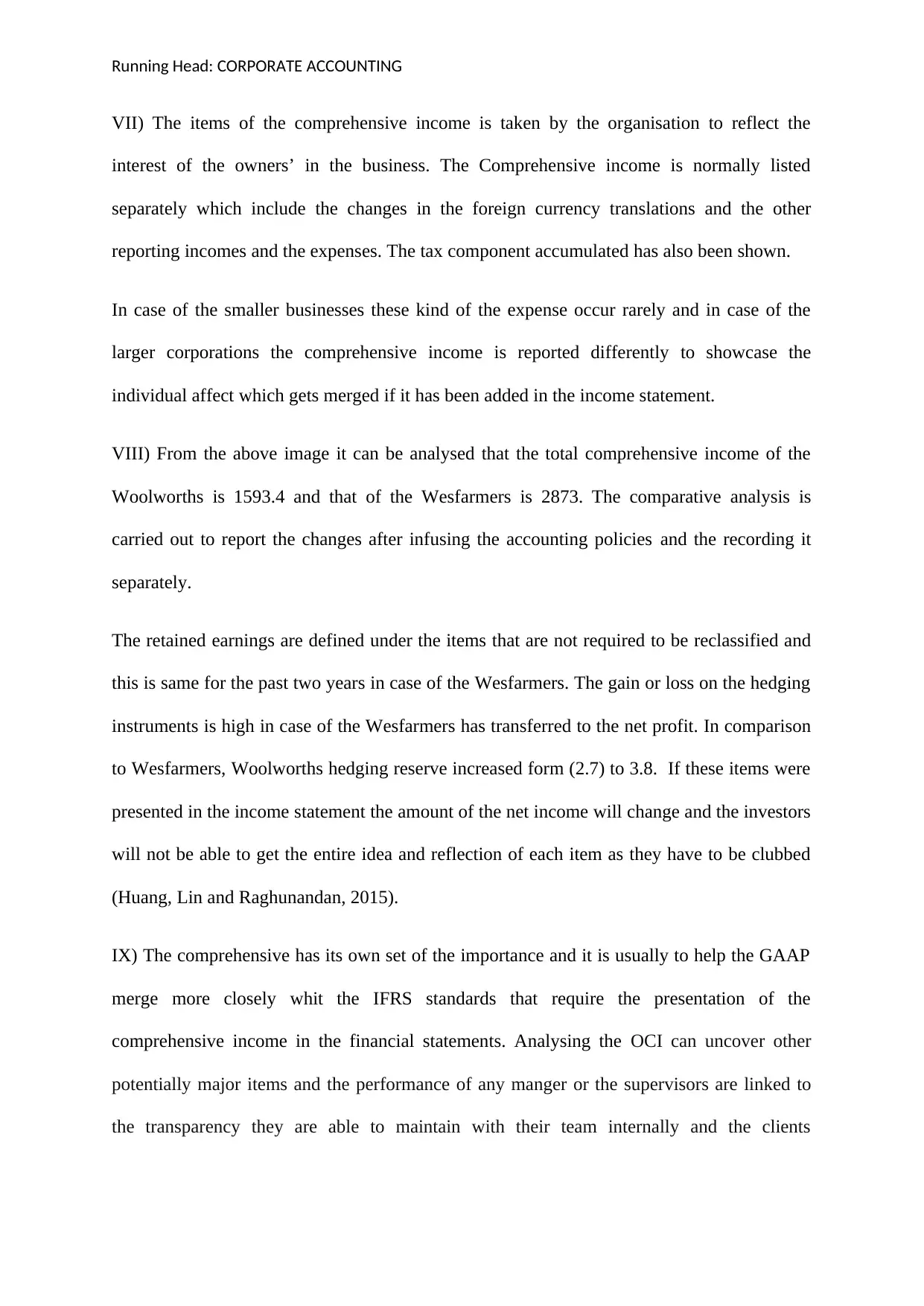
Running Head: CORPORATE ACCOUNTING
VII) The items of the comprehensive income is taken by the organisation to reflect the
interest of the owners’ in the business. The Comprehensive income is normally listed
separately which include the changes in the foreign currency translations and the other
reporting incomes and the expenses. The tax component accumulated has also been shown.
In case of the smaller businesses these kind of the expense occur rarely and in case of the
larger corporations the comprehensive income is reported differently to showcase the
individual affect which gets merged if it has been added in the income statement.
VIII) From the above image it can be analysed that the total comprehensive income of the
Woolworths is 1593.4 and that of the Wesfarmers is 2873. The comparative analysis is
carried out to report the changes after infusing the accounting policies and the recording it
separately.
The retained earnings are defined under the items that are not required to be reclassified and
this is same for the past two years in case of the Wesfarmers. The gain or loss on the hedging
instruments is high in case of the Wesfarmers has transferred to the net profit. In comparison
to Wesfarmers, Woolworths hedging reserve increased form (2.7) to 3.8. If these items were
presented in the income statement the amount of the net income will change and the investors
will not be able to get the entire idea and reflection of each item as they have to be clubbed
(Huang, Lin and Raghunandan, 2015).
IX) The comprehensive has its own set of the importance and it is usually to help the GAAP
merge more closely whit the IFRS standards that require the presentation of the
comprehensive income in the financial statements. Analysing the OCI can uncover other
potentially major items and the performance of any manger or the supervisors are linked to
the transparency they are able to maintain with their team internally and the clients
VII) The items of the comprehensive income is taken by the organisation to reflect the
interest of the owners’ in the business. The Comprehensive income is normally listed
separately which include the changes in the foreign currency translations and the other
reporting incomes and the expenses. The tax component accumulated has also been shown.
In case of the smaller businesses these kind of the expense occur rarely and in case of the
larger corporations the comprehensive income is reported differently to showcase the
individual affect which gets merged if it has been added in the income statement.
VIII) From the above image it can be analysed that the total comprehensive income of the
Woolworths is 1593.4 and that of the Wesfarmers is 2873. The comparative analysis is
carried out to report the changes after infusing the accounting policies and the recording it
separately.
The retained earnings are defined under the items that are not required to be reclassified and
this is same for the past two years in case of the Wesfarmers. The gain or loss on the hedging
instruments is high in case of the Wesfarmers has transferred to the net profit. In comparison
to Wesfarmers, Woolworths hedging reserve increased form (2.7) to 3.8. If these items were
presented in the income statement the amount of the net income will change and the investors
will not be able to get the entire idea and reflection of each item as they have to be clubbed
(Huang, Lin and Raghunandan, 2015).
IX) The comprehensive has its own set of the importance and it is usually to help the GAAP
merge more closely whit the IFRS standards that require the presentation of the
comprehensive income in the financial statements. Analysing the OCI can uncover other
potentially major items and the performance of any manger or the supervisors are linked to
the transparency they are able to maintain with their team internally and the clients
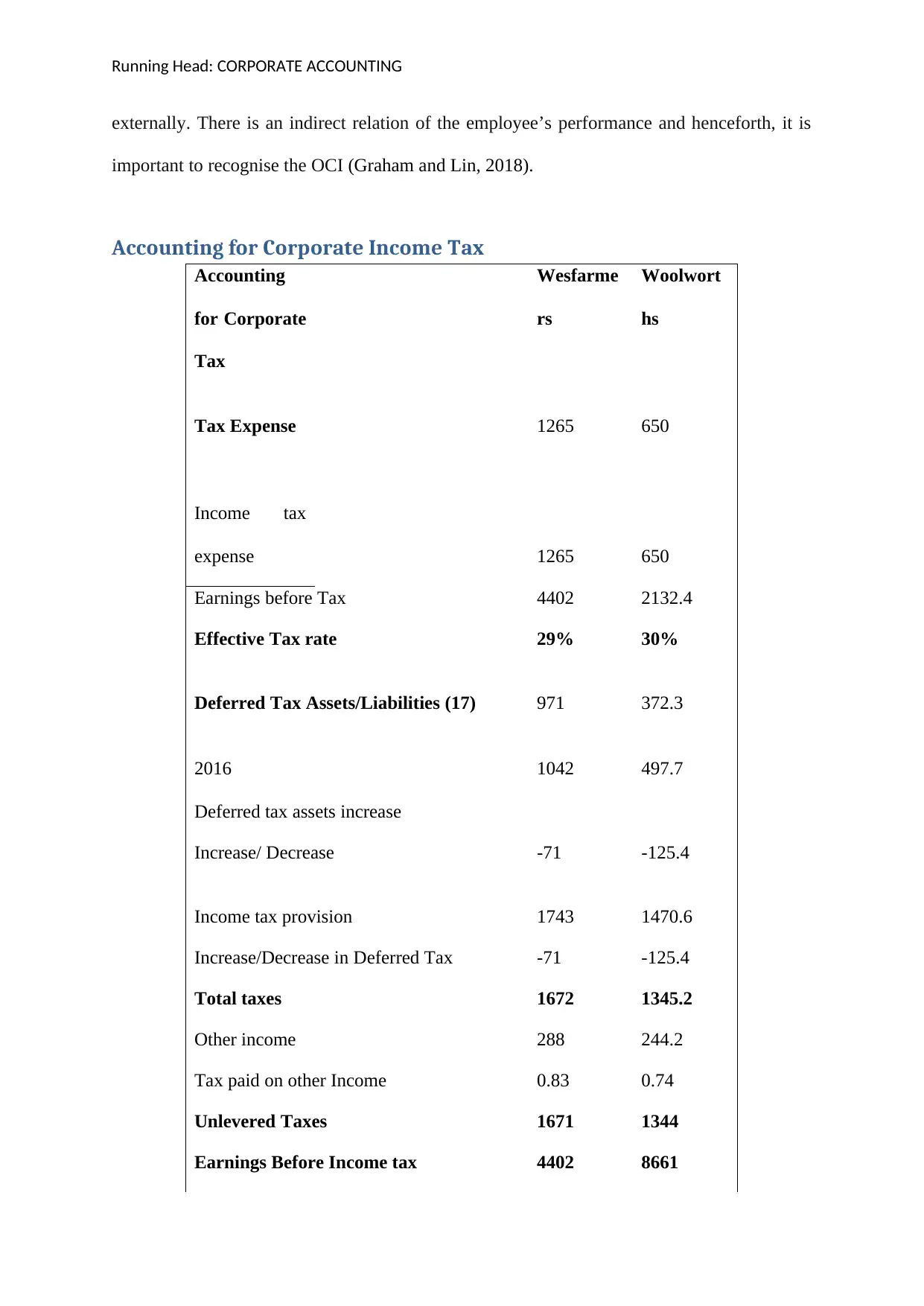
Running Head: CORPORATE ACCOUNTING
externally. There is an indirect relation of the employee’s performance and henceforth, it is
important to recognise the OCI (Graham and Lin, 2018).
Accounting for Corporate Income Tax
Accounting
for Corporate
Tax
Wesfarme
rs
Woolwort
hs
Tax Expense 1265 650
Income tax
expense 1265 650
Earnings before Tax 4402 2132.4
Effective Tax rate 29% 30%
Deferred Tax Assets/Liabilities (17) 971 372.3
2016 1042 497.7
Deferred tax assets increase
Increase/ Decrease -71 -125.4
Income tax provision 1743 1470.6
Increase/Decrease in Deferred Tax -71 -125.4
Total taxes 1672 1345.2
Other income 288 244.2
Tax paid on other Income 0.83 0.74
Unlevered Taxes 1671 1344
Earnings Before Income tax 4402 8661
externally. There is an indirect relation of the employee’s performance and henceforth, it is
important to recognise the OCI (Graham and Lin, 2018).
Accounting for Corporate Income Tax
Accounting
for Corporate
Tax
Wesfarme
rs
Woolwort
hs
Tax Expense 1265 650
Income tax
expense 1265 650
Earnings before Tax 4402 2132.4
Effective Tax rate 29% 30%
Deferred Tax Assets/Liabilities (17) 971 372.3
2016 1042 497.7
Deferred tax assets increase
Increase/ Decrease -71 -125.4
Income tax provision 1743 1470.6
Increase/Decrease in Deferred Tax -71 -125.4
Total taxes 1672 1345.2
Other income 288 244.2
Tax paid on other Income 0.83 0.74
Unlevered Taxes 1671 1344
Earnings Before Income tax 4402 8661
Secure Best Marks with AI Grader
Need help grading? Try our AI Grader for instant feedback on your assignments.
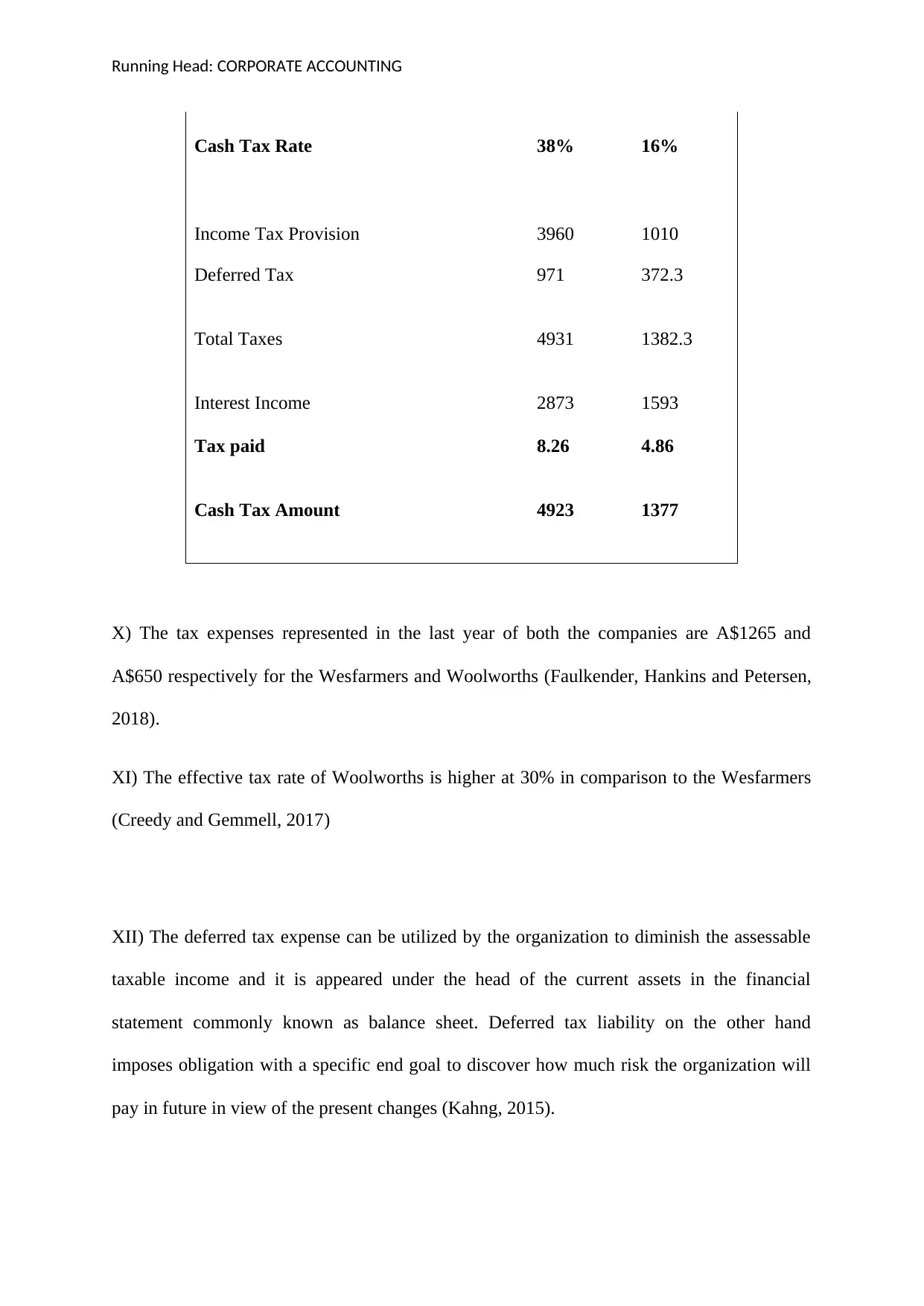
Running Head: CORPORATE ACCOUNTING
Cash Tax Rate 38% 16%
Income Tax Provision 3960 1010
Deferred Tax 971 372.3
Total Taxes 4931 1382.3
Interest Income 2873 1593
Tax paid 8.26 4.86
Cash Tax Amount 4923 1377
X) The tax expenses represented in the last year of both the companies are A$1265 and
A$650 respectively for the Wesfarmers and Woolworths (Faulkender, Hankins and Petersen,
2018).
XI) The effective tax rate of Woolworths is higher at 30% in comparison to the Wesfarmers
(Creedy and Gemmell, 2017)
XII) The deferred tax expense can be utilized by the organization to diminish the assessable
taxable income and it is appeared under the head of the current assets in the financial
statement commonly known as balance sheet. Deferred tax liability on the other hand
imposes obligation with a specific end goal to discover how much risk the organization will
pay in future in view of the present changes (Kahng, 2015).
Cash Tax Rate 38% 16%
Income Tax Provision 3960 1010
Deferred Tax 971 372.3
Total Taxes 4931 1382.3
Interest Income 2873 1593
Tax paid 8.26 4.86
Cash Tax Amount 4923 1377
X) The tax expenses represented in the last year of both the companies are A$1265 and
A$650 respectively for the Wesfarmers and Woolworths (Faulkender, Hankins and Petersen,
2018).
XI) The effective tax rate of Woolworths is higher at 30% in comparison to the Wesfarmers
(Creedy and Gemmell, 2017)
XII) The deferred tax expense can be utilized by the organization to diminish the assessable
taxable income and it is appeared under the head of the current assets in the financial
statement commonly known as balance sheet. Deferred tax liability on the other hand
imposes obligation with a specific end goal to discover how much risk the organization will
pay in future in view of the present changes (Kahng, 2015).
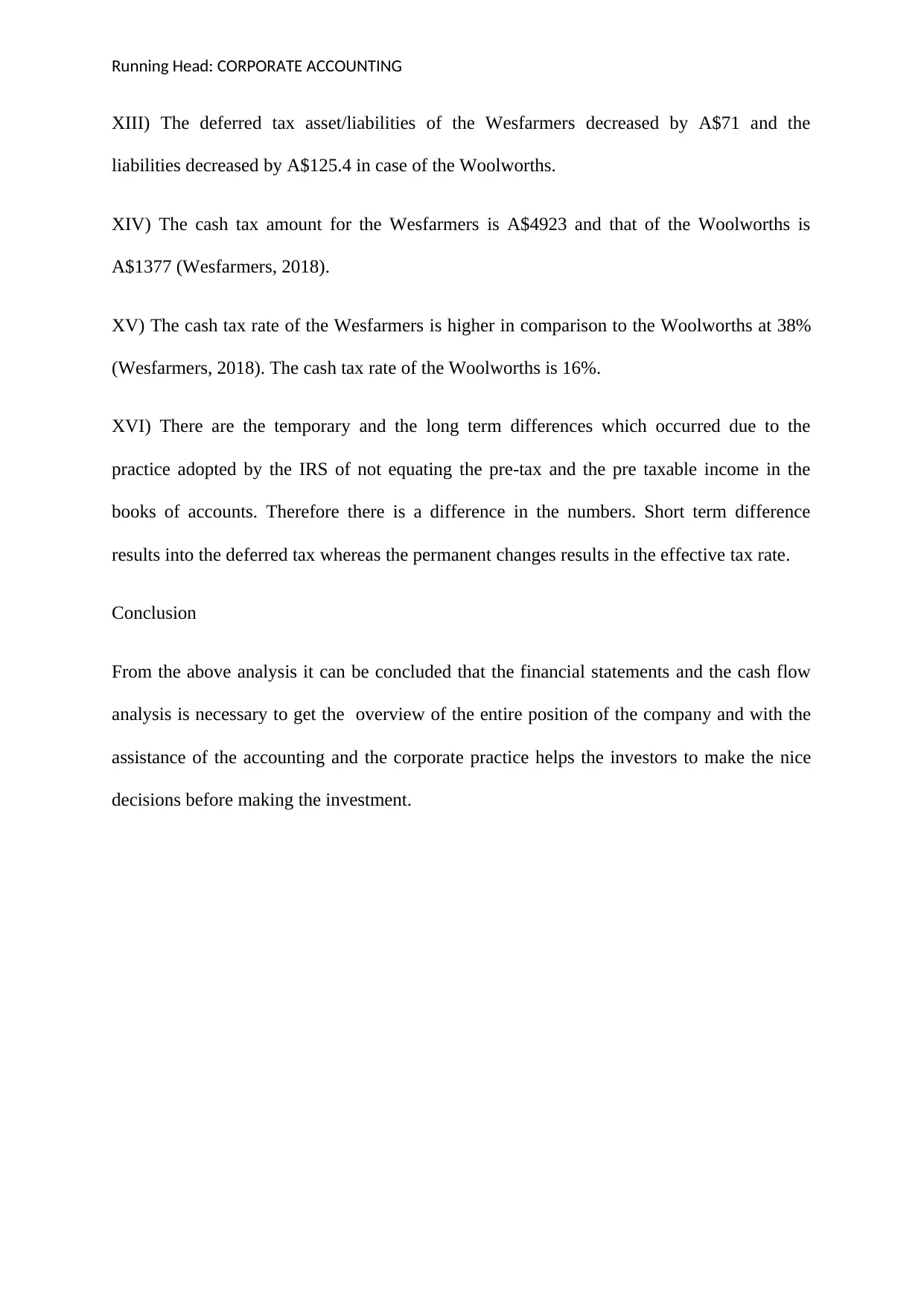
Running Head: CORPORATE ACCOUNTING
XIII) The deferred tax asset/liabilities of the Wesfarmers decreased by A$71 and the
liabilities decreased by A$125.4 in case of the Woolworths.
XIV) The cash tax amount for the Wesfarmers is A$4923 and that of the Woolworths is
A$1377 (Wesfarmers, 2018).
XV) The cash tax rate of the Wesfarmers is higher in comparison to the Woolworths at 38%
(Wesfarmers, 2018). The cash tax rate of the Woolworths is 16%.
XVI) There are the temporary and the long term differences which occurred due to the
practice adopted by the IRS of not equating the pre-tax and the pre taxable income in the
books of accounts. Therefore there is a difference in the numbers. Short term difference
results into the deferred tax whereas the permanent changes results in the effective tax rate.
Conclusion
From the above analysis it can be concluded that the financial statements and the cash flow
analysis is necessary to get the overview of the entire position of the company and with the
assistance of the accounting and the corporate practice helps the investors to make the nice
decisions before making the investment.
XIII) The deferred tax asset/liabilities of the Wesfarmers decreased by A$71 and the
liabilities decreased by A$125.4 in case of the Woolworths.
XIV) The cash tax amount for the Wesfarmers is A$4923 and that of the Woolworths is
A$1377 (Wesfarmers, 2018).
XV) The cash tax rate of the Wesfarmers is higher in comparison to the Woolworths at 38%
(Wesfarmers, 2018). The cash tax rate of the Woolworths is 16%.
XVI) There are the temporary and the long term differences which occurred due to the
practice adopted by the IRS of not equating the pre-tax and the pre taxable income in the
books of accounts. Therefore there is a difference in the numbers. Short term difference
results into the deferred tax whereas the permanent changes results in the effective tax rate.
Conclusion
From the above analysis it can be concluded that the financial statements and the cash flow
analysis is necessary to get the overview of the entire position of the company and with the
assistance of the accounting and the corporate practice helps the investors to make the nice
decisions before making the investment.
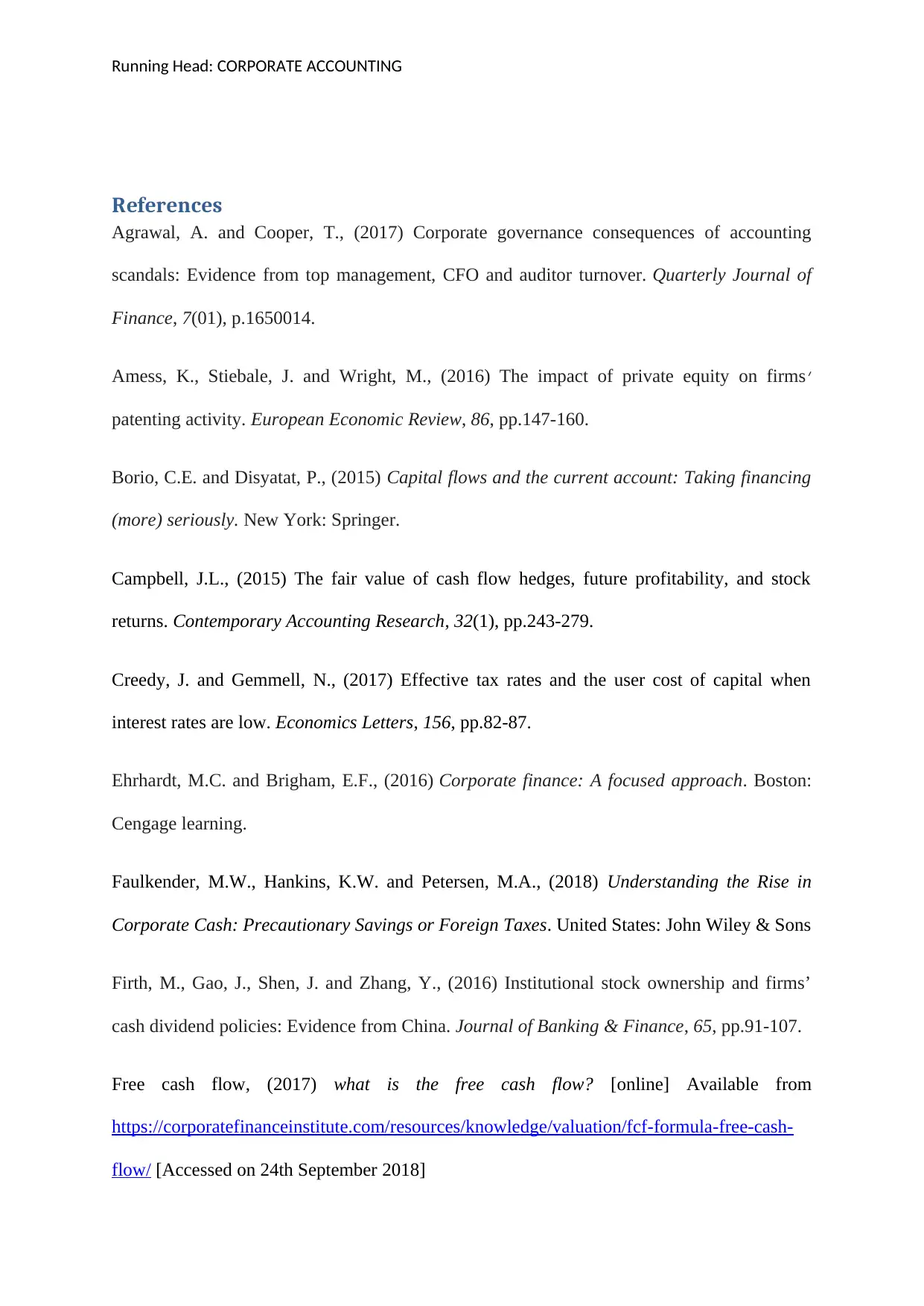
Running Head: CORPORATE ACCOUNTING
References
Agrawal, A. and Cooper, T., (2017) Corporate governance consequences of accounting
scandals: Evidence from top management, CFO and auditor turnover. Quarterly Journal of
Finance, 7(01), p.1650014.
Amess, K., Stiebale, J. and Wright, M., (2016) The impact of private equity on firms׳
patenting activity. European Economic Review, 86, pp.147-160.
Borio, C.E. and Disyatat, P., (2015) Capital flows and the current account: Taking financing
(more) seriously. New York: Springer.
Campbell, J.L., (2015) The fair value of cash flow hedges, future profitability, and stock
returns. Contemporary Accounting Research, 32(1), pp.243-279.
Creedy, J. and Gemmell, N., (2017) Effective tax rates and the user cost of capital when
interest rates are low. Economics Letters, 156, pp.82-87.
Ehrhardt, M.C. and Brigham, E.F., (2016) Corporate finance: A focused approach. Boston:
Cengage learning.
Faulkender, M.W., Hankins, K.W. and Petersen, M.A., (2018) Understanding the Rise in
Corporate Cash: Precautionary Savings or Foreign Taxes. United States: John Wiley & Sons
Firth, M., Gao, J., Shen, J. and Zhang, Y., (2016) Institutional stock ownership and firms’
cash dividend policies: Evidence from China. Journal of Banking & Finance, 65, pp.91-107.
Free cash flow, (2017) what is the free cash flow? [online] Available from
https://corporatefinanceinstitute.com/resources/knowledge/valuation/fcf-formula-free-cash-
flow/ [Accessed on 24th September 2018]
References
Agrawal, A. and Cooper, T., (2017) Corporate governance consequences of accounting
scandals: Evidence from top management, CFO and auditor turnover. Quarterly Journal of
Finance, 7(01), p.1650014.
Amess, K., Stiebale, J. and Wright, M., (2016) The impact of private equity on firms׳
patenting activity. European Economic Review, 86, pp.147-160.
Borio, C.E. and Disyatat, P., (2015) Capital flows and the current account: Taking financing
(more) seriously. New York: Springer.
Campbell, J.L., (2015) The fair value of cash flow hedges, future profitability, and stock
returns. Contemporary Accounting Research, 32(1), pp.243-279.
Creedy, J. and Gemmell, N., (2017) Effective tax rates and the user cost of capital when
interest rates are low. Economics Letters, 156, pp.82-87.
Ehrhardt, M.C. and Brigham, E.F., (2016) Corporate finance: A focused approach. Boston:
Cengage learning.
Faulkender, M.W., Hankins, K.W. and Petersen, M.A., (2018) Understanding the Rise in
Corporate Cash: Precautionary Savings or Foreign Taxes. United States: John Wiley & Sons
Firth, M., Gao, J., Shen, J. and Zhang, Y., (2016) Institutional stock ownership and firms’
cash dividend policies: Evidence from China. Journal of Banking & Finance, 65, pp.91-107.
Free cash flow, (2017) what is the free cash flow? [online] Available from
https://corporatefinanceinstitute.com/resources/knowledge/valuation/fcf-formula-free-cash-
flow/ [Accessed on 24th September 2018]
Paraphrase This Document
Need a fresh take? Get an instant paraphrase of this document with our AI Paraphraser
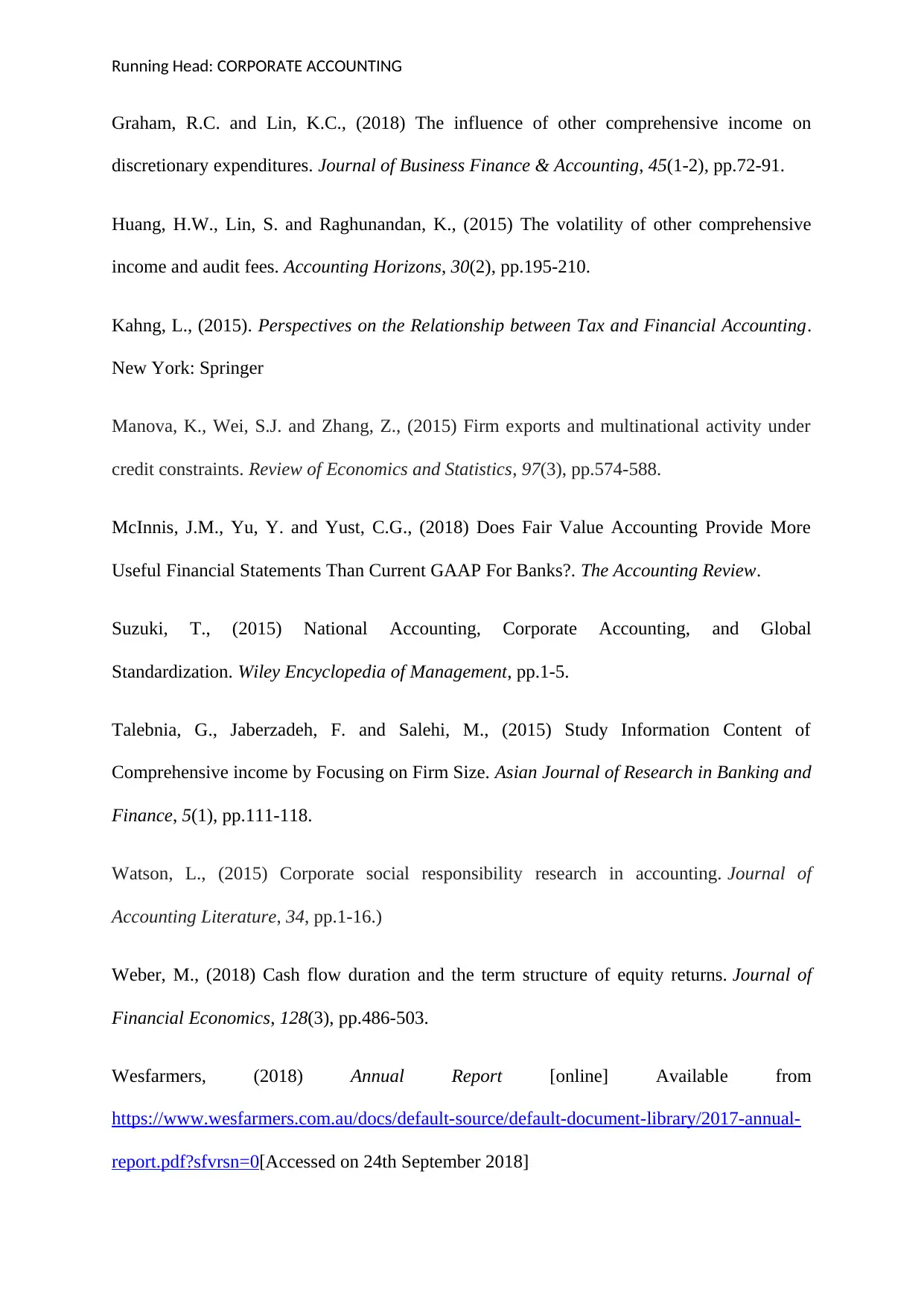
Running Head: CORPORATE ACCOUNTING
Graham, R.C. and Lin, K.C., (2018) The influence of other comprehensive income on
discretionary expenditures. Journal of Business Finance & Accounting, 45(1-2), pp.72-91.
Huang, H.W., Lin, S. and Raghunandan, K., (2015) The volatility of other comprehensive
income and audit fees. Accounting Horizons, 30(2), pp.195-210.
Kahng, L., (2015). Perspectives on the Relationship between Tax and Financial Accounting.
New York: Springer
Manova, K., Wei, S.J. and Zhang, Z., (2015) Firm exports and multinational activity under
credit constraints. Review of Economics and Statistics, 97(3), pp.574-588.
McInnis, J.M., Yu, Y. and Yust, C.G., (2018) Does Fair Value Accounting Provide More
Useful Financial Statements Than Current GAAP For Banks?. The Accounting Review.
Suzuki, T., (2015) National Accounting, Corporate Accounting, and Global
Standardization. Wiley Encyclopedia of Management, pp.1-5.
Talebnia, G., Jaberzadeh, F. and Salehi, M., (2015) Study Information Content of
Comprehensive income by Focusing on Firm Size. Asian Journal of Research in Banking and
Finance, 5(1), pp.111-118.
Watson, L., (2015) Corporate social responsibility research in accounting. Journal of
Accounting Literature, 34, pp.1-16.)
Weber, M., (2018) Cash flow duration and the term structure of equity returns. Journal of
Financial Economics, 128(3), pp.486-503.
Wesfarmers, (2018) Annual Report [online] Available from
https://www.wesfarmers.com.au/docs/default-source/default-document-library/2017-annual-
report.pdf?sfvrsn=0[Accessed on 24th September 2018]
Graham, R.C. and Lin, K.C., (2018) The influence of other comprehensive income on
discretionary expenditures. Journal of Business Finance & Accounting, 45(1-2), pp.72-91.
Huang, H.W., Lin, S. and Raghunandan, K., (2015) The volatility of other comprehensive
income and audit fees. Accounting Horizons, 30(2), pp.195-210.
Kahng, L., (2015). Perspectives on the Relationship between Tax and Financial Accounting.
New York: Springer
Manova, K., Wei, S.J. and Zhang, Z., (2015) Firm exports and multinational activity under
credit constraints. Review of Economics and Statistics, 97(3), pp.574-588.
McInnis, J.M., Yu, Y. and Yust, C.G., (2018) Does Fair Value Accounting Provide More
Useful Financial Statements Than Current GAAP For Banks?. The Accounting Review.
Suzuki, T., (2015) National Accounting, Corporate Accounting, and Global
Standardization. Wiley Encyclopedia of Management, pp.1-5.
Talebnia, G., Jaberzadeh, F. and Salehi, M., (2015) Study Information Content of
Comprehensive income by Focusing on Firm Size. Asian Journal of Research in Banking and
Finance, 5(1), pp.111-118.
Watson, L., (2015) Corporate social responsibility research in accounting. Journal of
Accounting Literature, 34, pp.1-16.)
Weber, M., (2018) Cash flow duration and the term structure of equity returns. Journal of
Financial Economics, 128(3), pp.486-503.
Wesfarmers, (2018) Annual Report [online] Available from
https://www.wesfarmers.com.au/docs/default-source/default-document-library/2017-annual-
report.pdf?sfvrsn=0[Accessed on 24th September 2018]
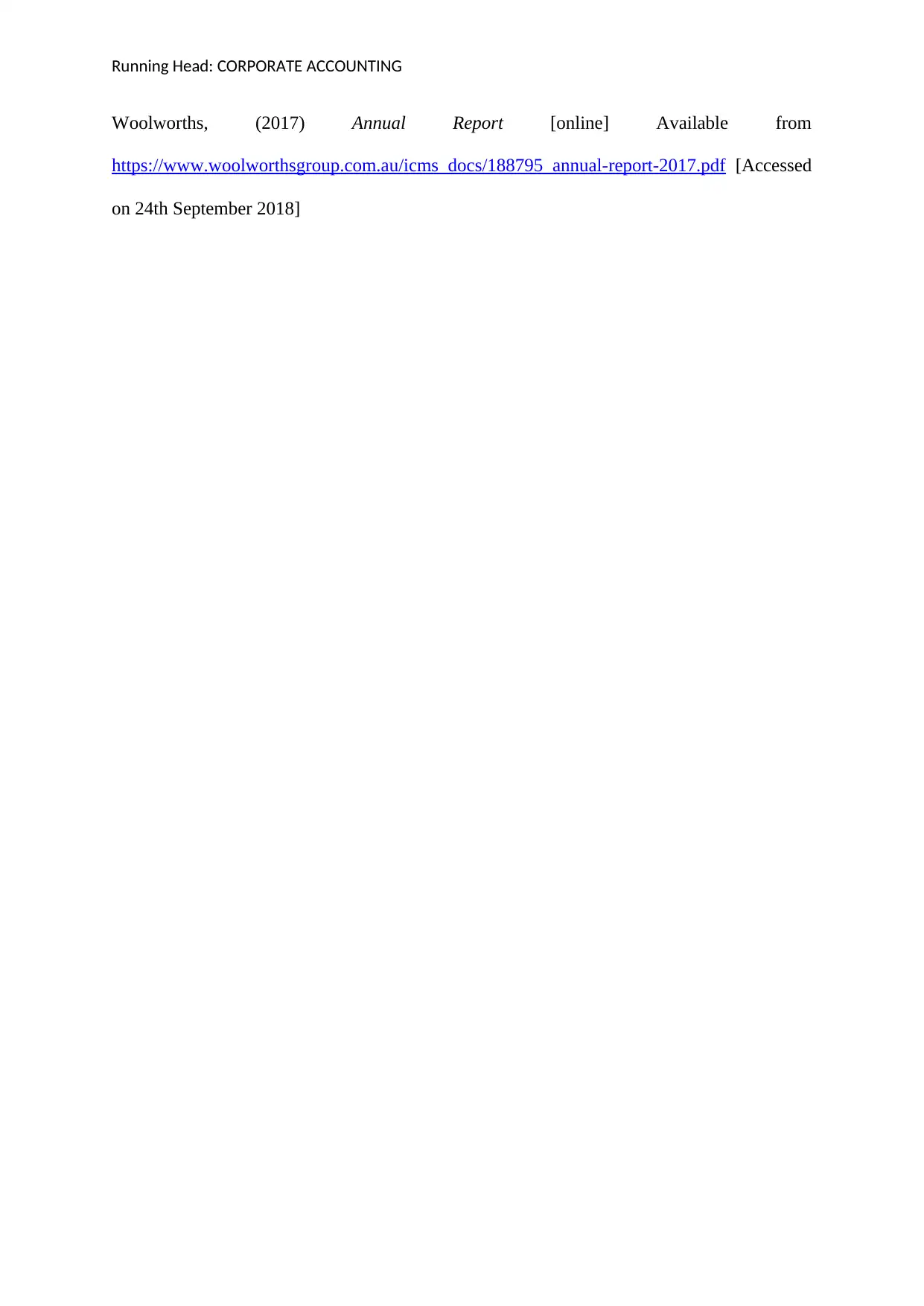
Running Head: CORPORATE ACCOUNTING
Woolworths, (2017) Annual Report [online] Available from
https://www.woolworthsgroup.com.au/icms_docs/188795_annual-report-2017.pdf [Accessed
on 24th September 2018]
Woolworths, (2017) Annual Report [online] Available from
https://www.woolworthsgroup.com.au/icms_docs/188795_annual-report-2017.pdf [Accessed
on 24th September 2018]
1 out of 27
Related Documents
Your All-in-One AI-Powered Toolkit for Academic Success.
+13062052269
info@desklib.com
Available 24*7 on WhatsApp / Email
![[object Object]](/_next/static/media/star-bottom.7253800d.svg)
Unlock your academic potential
© 2024 | Zucol Services PVT LTD | All rights reserved.


